What’s OpenWrt
OpenWrt is a highly extensible GNU/Linux distribution for embedded devices (typically wireless routers). Unlike many other distributions for these routers, OpenWrt is built from the ground up to be a full-featured, easily modifiable operating system for your router.
Instead of trying to create a single, static firmware, OpenWrt provides a fully writable filesystem with optional package management. This frees you from the restrictions of the application selection and configuration provided by the vendor and allows you to use packages to customize an embedded device to suit any application. For developers, OpenWrt provides a framework to build an application without having to create a complete firmware image and distribution around it. For users, this means the freedom of full customization, allowing the use of an embedded device in ways the vendor never envisioned.
OpenWrt is not intended to be a distribution you can load onto an embedded device and expect to do everything you want out of the box. Instead, the OpenWrt framework allows you to tailor your embedded operating system to your own particular needs. At the very least, you should add features you require to the bare OpenWrt installation by installing software packages, such as a graphical web interface that provides easy access for beginners.
OpenWrt’s objectives: - OpenWrt will never be a product, but something which makes it easy to build a product. - OpenWrt will never be finished, never be complete, but will always be tracking the progress of technology. - OpenWrt will never be specific, it will always remain generic. - OpenWrt will never be the cathedral, it will simply supply the building blocks to construct one.
https://wiki.openwrt.org/about/start
OpenWrt’s goals:
- behave like a normal Linux system
- abstract the hardware
- e.g. same wifi configuration over all chips
- use upstream code and upstream own extensions
- trunk normally uses a recent upstream kernel, currently 3.18 or 4.1
- image (kernel + rootfs) + optional packages
- build one kernel binary which boots on different boards and SoCs
- runtime board detection (e.g. device tree)
- customization for specific boards with selected packages
https://prplworks.files.wordpress.com/2015/10/openwrt-adding-new-soc.pdf
OpenWrt Operating System Architecture
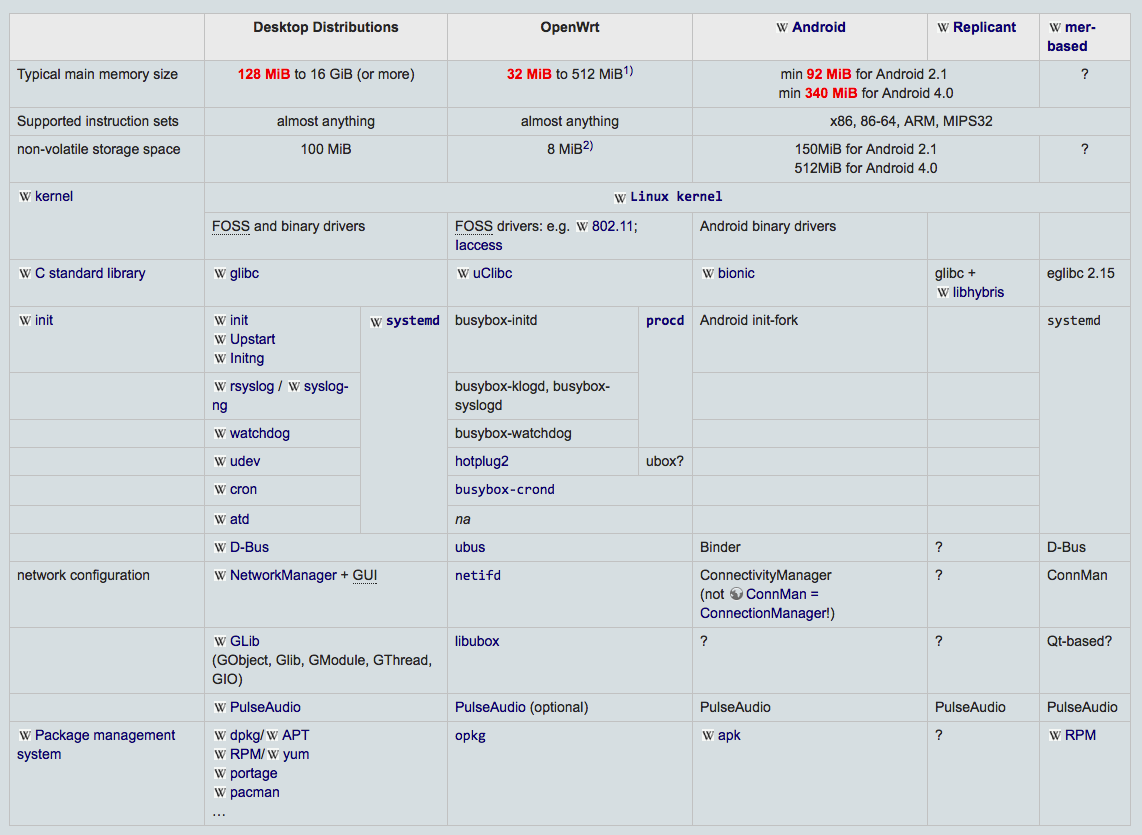
https://wiki.openwrt.org/doc/techref/procd
https://wiki.openwrt.org/inbox/procd-init-scripts
Branch and Codename
The code names of OpenWrt branches are named after alcoholic beverages, usually including their recipes in the MOTD as well, cf. White Russian, Kamikaze, Backfire, Attitude Adjustment, Barrier Breaker.
| Code Name | Version | Status |
|---|---|---|
| Designated Driver | developing | trunk |
| Chaos Calmer | 15.05.1 | current stable |
| Chaos Calmer | 15.05 | |
| Barrier Breaker | 14.07 | |
| Attitude Adjustment | 12.09 |
https://wiki.openwrt.org/about/history
https://en.wikipedia.org/wiki/OpenWrt#History
Build
Toolchain
OpenWrt build system is the buildsystem for the OpenWrt Linux distribution. OpenWrt build system works on Linux, BSD or MacOSX operating system. A case-sensitive filesystem is required.
It is recommended that you use a Linux distribution (Debian or Ubuntu), either a standalone installation or one running in a virtual environment (VirtualBox or VMware).
sudo apt-get update
sudo apt-get install git-core build-essential libssl-dev libncurses5-dev unzip gawk
sudo apt-get install subversion mercurial
https://wiki.openwrt.org/doc/howto/buildroot.exigence
Download
git clone https://git.openwrt.org/openwrt.git
Quick Start
$ ./scripts/feeds update -a
$ ./scripts/feeds install -a
$ make menuconfig # config target options for most cases
$ make [-jN] [V=scw] # -jN optional, N is the number of cpu cores, V=s/c/w for warning, errors and tracing
The parameter V=x specifies level of messages in the process of the build.
V=99 and V=1 are now deprecated in favor of a new verbosity class system,
though the old flags are still supported.
You can set the V variable on the command line (or OPENWRT_VERBOSE in the
environment) to one or more of the following characters:
- s: stdout+stderr (equal to the old V=99)
- c: commands (for build systems that suppress commands by default, e.g. kbuild, cmake)
- w: warnings/errors only (equal to the old V=1)
```
The OpenWrt build system is a set of Makefiles and patches that allows users to easily
generate both a cross-compilation toolchain and a root filesystem for embedded systems.
### Build System Features
- Makes it easy to port software
- Uses kconfig (Linux Kernel menuconfig) for configuration of features
- Provides integrated cross-compiler toolchain (gcc, ld, ...)
- Provides abstraction for autotools (automake, autoconf), cmake, scons
- Handles standard download, patch, configure, compile and packaging workflow
- Provides a number of common fixups for badly behaving packages
### Make Targets
- Offers a number of high level make targets for standard package workflows
- Targets always in the format "component/name/action", e.g. "toolchain/gdb/compile" or "package/mtd/install"
- Prepare a package source tree: package/foo/prepare
- Compile a package: package/foo/compile
- Clean a package: package/foo/clean
```
make[2] toolchain/install
make[3] -C toolchain install
make[2] target/compile
make[3] -C target compile
make[4] -C target/utils prepare
```
> https://wiki.openwrt.org/about/toolchain
### Build Sequence
tools - automake, autoconf, sed, cmake toolchain/binutils - as, ld, … toolchain/gcc - gcc, g++, cpp, … target/linux - kernel modules package - core and feed packages target/linux - kernel image target/linux/image - firmware image file generation ```
Make Sequence
Top command make world calls the following sequence of the commands:
make target/compile
make package/cleanup
make package/compile
make package/install
make package/preconfig
make target/install
make package/index
You may run each command independency. For example, if the process of compilation of packages stops on error, you may fix the problem and next continue without cleanup:
make package/compile
make package/install
make package/preconfig
make target/install
make package/index
https://wiki.openwrt.org/doc/techref/buildroot
Notes About Buildroot / SDK
The OpenWrt project provides two main ways to get your software compiled for and running on an OpenWrt device. - The first option is to download and build the complete toolchain (buildroot) - The second is to download and/or build the SDK, a stripped down version of the toolchain intended to only build packages, and not firmware images.
> https://github.com/MagnusS/p2p-dprd/wiki/BuildingOpenWrtPackages
> https://forum.openwrt.org/viewtopic.php?pid=31794#p31794
Usage Example
Updating Feeds
./scripts/feeds update -a
./scripts/feeds install -a
./scripts/feeds install <PACKAGENAME>
Config
make menuconfig
-or-
make defconfig
- target:
target/linux/<target>, represent SoC line- target name
- cpu type
- compiler options
- kernel patches
- additional kernel files
- kernel configuration
- image building scripts
- base files
- subtarget:
target/linux/<target>/<subtarget>, represent SoC generation- specialization of a target
- different kernel options
- different compiler options
- specialization of a target
- profile:
target/linux/<target>/<subtarget>/profiles/<vendor>.mk, for each board- same kernel binary as above (sub)target
- different default packages
-
specific image headers
https://prplworks.files.wordpress.com/2015/10/openwrt-adding-new-soc.pdf
./scripts/diffconfig.sh > diffconfig # write the changes to diffconfig
cp diffconfig .config # write changes to .config
make defconfig # expand to full config
make kernel_menuconfig CONFIG_TARGET=subtarget # -> kernel config, optional
Build Images
make
-or-
make world
Clean Up
Clean
make clean
deletes contents of the directories /bin and /build_dir. make clean does not remove the toolchain, it also avoids cleaning architectures/targets other than the one you have selected in your .config.
Dirclean
make dirclean
deletes contents of the directories /bin and /build_dir and additionally /staging_dir and /toolchain (=the cross-compile tools) and /logs. ‘dirclean’ is your basic “full clean” operation.
Distclean
make distclean
nukes everything you have compiled or configured and also deletes all downloaded feeds contents and package sources.
CAUTION: In addition to all else, this will erase your build configuration (
Clean Small Part
make target/linux/clean
make package/base-files/clean
make package/luci/clean
Make Tips
Building Single Packages
make package/cups/compile V=s
make package/cups/{clean,compile,install} V=s # for a rebuild
Spotting Build Errors
make V=s 2>&1 | tee build.log | grep -i error
Getting Beep Notification
make V=s ; echo -e '\a'
Skipping Failed Packages
IGNORE_ERRORS=1 make <make options>
https://wiki.openwrt.org/doc/howto/build
https://forum.openwrt.org/viewtopic.php?id=28267
Buildroot
Overview
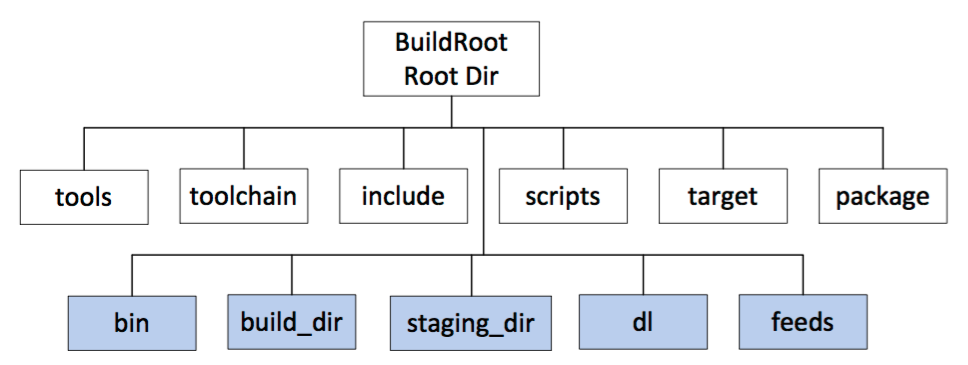
The folders in the second lines are generated during compilation.
- tools - contains all the build instructions to fetch the image building tools
- toolchain - contains all the build instructions to fetch the kernel headers, the C library, the bin-utils, the compiler itself and the debugger. If you add a completely new architecture, you would add a configuration for the C library here.
- target - build instruction for firmware image generating process and for the kernel building process; compiles kernel and firmware image utilities, builds firmware image, generate Image Generator (former called Image Builder)
- package - the OpenWrt Makefiles and patches for all the main packages. The OpenWrt Makefile has its own syntax, different from the conventional Makefile of Linux make tool. The OpenWrt Make file defines the meta information of the package, where to download the package, how to compile, where to installed the compiled binaries, etc. See How to Build OpenWrt Application Package for more detail.
- include -
- scripts - perl scripts that does the OpenWrt package management
- dl - Where the user-space package tarballs will be downloaded
- build_dir - where all user-space tools will be cross-compiled
- staging_dir - where the cross-compilation tools will be installed
- feeds -
- bin - where the firmware image will be generated and all the .ipk package files will be generated
Simply speaking, once the OpenWrt buildroot has been properly configured, e.g. the target platform and architecture is specified, user-space packages selected, etc., the OpenWrt Buildroot will do the image building through the following steps (once the configuration is done):
- Download the cross-compilation tools, kernel headers, etc. and
- Set up the staging directory (
staging_dir/). This is where the cross-compilation toolchain will be installed. If you want to use the same cross-compilation toolchain for other purposes, such as compiling third-party applications, you can find the cross-compiler tools in this directory, and then use arch-linux-gcc to compile your application. - Create the download directory (
dl/by default). This is where the tarballs will be downloaded. - Create the build directory (
build_dir/). This is where all user-space tools while be compiled. - Create the target directory (
build_dir/target-arch/rootby default) and the target filesystem skeleton. This directory will contain the final root filesystem. - Install the user-space packages to the root file system and compress the whole root file system with proper format.
The result firmware image is generated in
bin/.
http://www.ccs.neu.edu/home/noubir/Courses/CS6710/S12/material/OpenWrt_Dev_Tutorial.pdf
How Buildroot Works
Buildroot is basically a set of Makefiles that download, configure, and compile software with the correct options. It also includes patches for various software packages.
Each directory contains at least 2 files: - something.mk is the Makefile that downloads, configures, compiles and installs the package something. - Config.in is a part of the configuration tool description file. It describes the options related to the package.
The main Makefile performs the following steps (once the configuration is done): - Create all the output directories: staging, target, build, etc. in the output directory (output/ by default, another value can be specified using O=) - Generate the toolchain target. When an internal toolchain is used, this means generating the cross-compilation toolchain. When an external toolchain is used, this means checking the features of the external toolchain and importing it into the Buildroot environment. - Generate all the targets listed in the TARGETS variable. This variable is filled by all the individual components’ Makefiles. Generating these targets will trigger the compilation of the userspace packages (libraries, programs), the kernel, the bootloader and the generation of the root filesystem images, depending on the configuration.
https://buildroot.org/downloads/manual/manual.html
Package Infrastructures
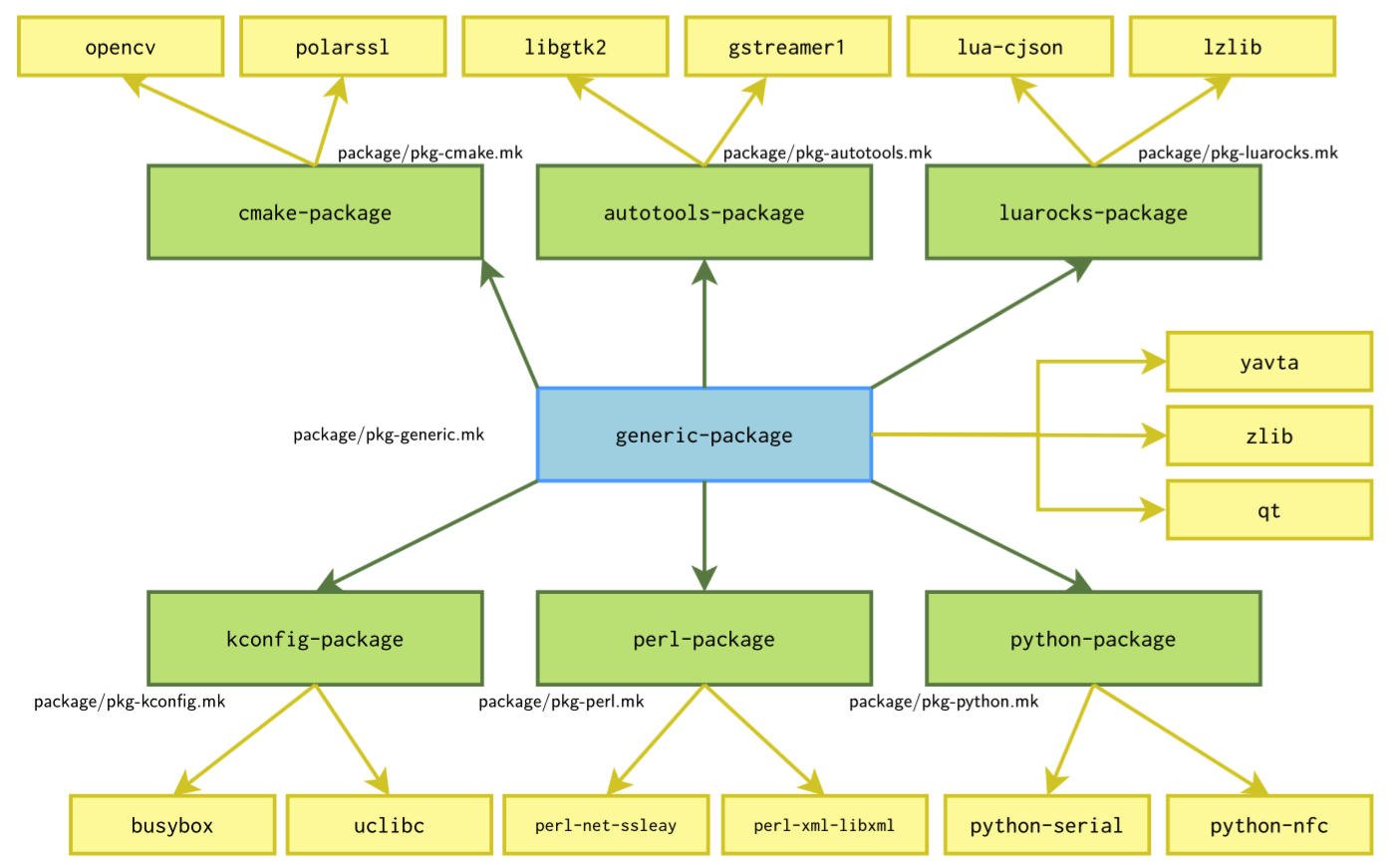
- Each software component to be built by Buildroot comes with its own build system.
- Buildroot does not re-invent the build system of each component, it simply uses it.
- Numerous build systems available: hand-written Makefiles or shell scripts, autotools, CMake and also some specific to languages: Python, Perl, Lua, Erlang, etc.
- In order to avoid duplicating code, Buildroot has package infrastructures for well-known build systems.
- And a generic package infrastructure for software components with non-standard build systems.
Workflow
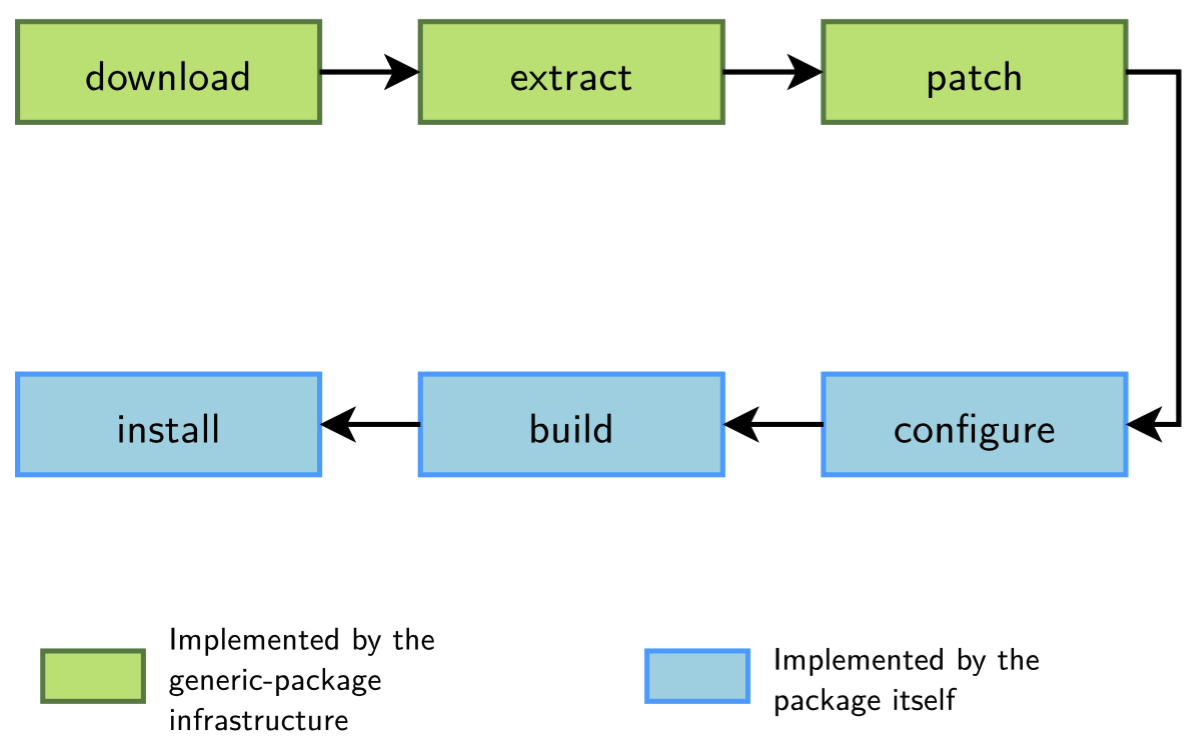
- To be used for software components having non-standard build systems.
- Implements a default behavior for the downloading, extracting and patching steps of the package build process.
- Implements init script installation, legal information collection, etc.
- Leaves to the package developer the responsibility of describing what should be done for the configuration, building and installation steps.
Build System Architecture

Package Build Example
>>> zlib 1.2.8 Downloading
... here it wgets the tarball ...
>>> zlib 1.2.8 Extracting
xzcat /home/thomas/dl/zlib-1.2.8.tar.xz | tar ...
>>> zlib 1.2.8 Patching
>>> zlib 1.2.8 Configuring
(cd /home/thomas/projets/buildroot/output/build/zlib-1.2.8;
...
./configure --shared --prefix=/usr)
>>> zlib 1.2.8 Building
/usr/bin/make -j1 -C /home/thomas/projets/buildroot/output/build/zlib-1.2.8
>>> zlib 1.2.8 Installing to staging directory
/usr/bin/make -j1 -C /home/thomas/projets/buildroot/output/build/zlib-1.2.8
DESTDIR=/home/thomas/projets/buildroot/output/host/usr/arm-buildroot-linux-uclibcgnueabi/sysroot
LDCONFIG=true install
>>> zlib 1.2.8 Installing to target
/usr/bin/make -j1 -C /home/thomas/projets/buildroot/output/build/zlib-1.2.8
DESTDIR=/home/thomas/projets/buildroot/output/target
LDCONFIG=true install
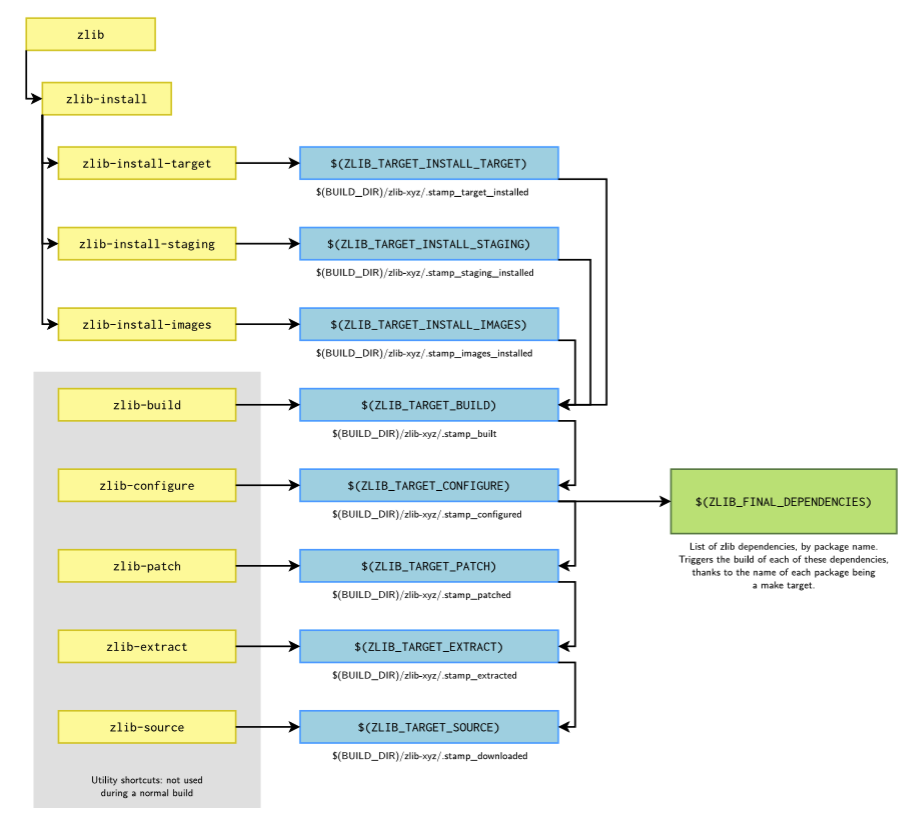
When You Run Make…
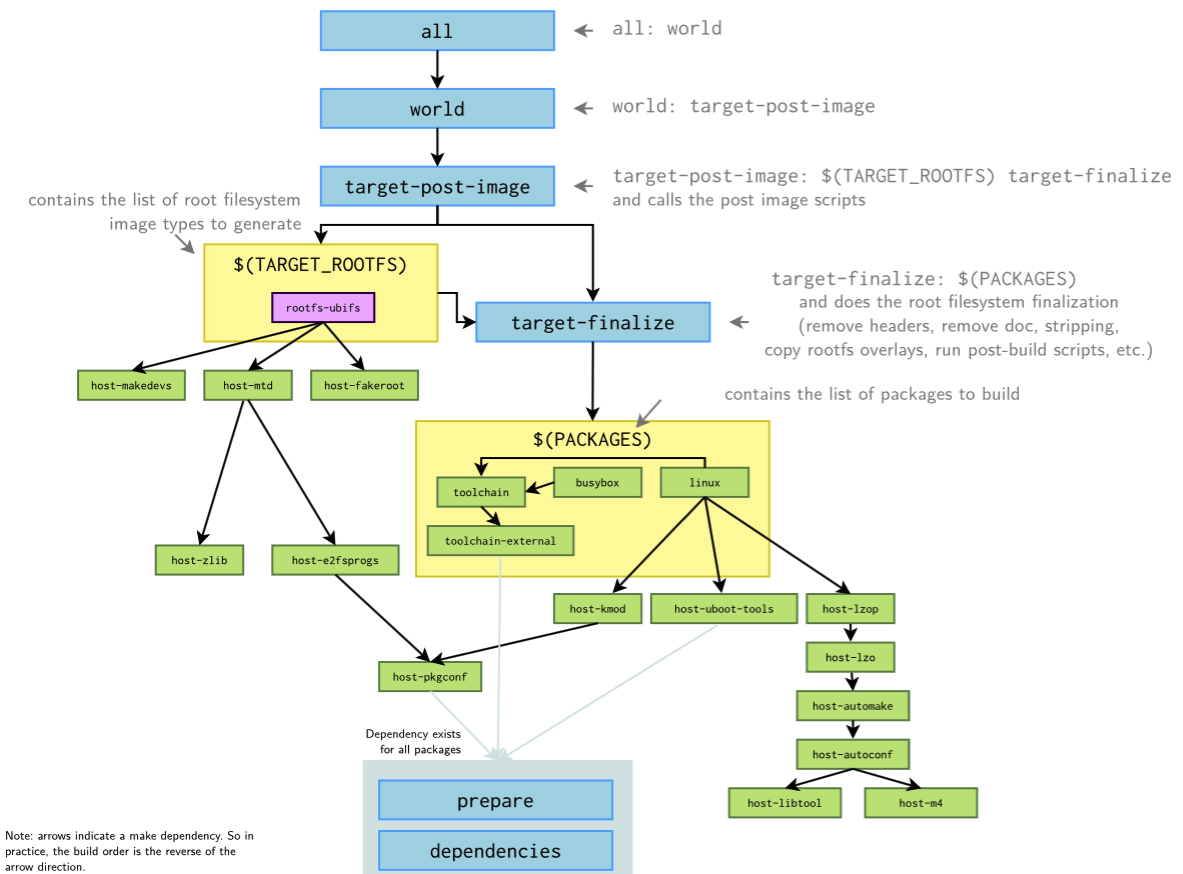
http://free-electrons.com/doc/training/buildroot/buildroot-slides.pdf
Misc
- Buildroot is really an integration utility. Once a package has been built, it is not rebuilt, even if its source code changes.
- When working on the development of a component, it is usually more convenient to build it outside of Buildroot, for a quicker compile/test/debug cycle.
- The upcoming source directory override feature, covered later, makes it easier to use Buildroot during development.
http://elinux.org/images/2/2a/Using-buildroot-real-project.pdf
Config
The UCI System
The abbreviation UCI stands for Unified Configuration Interface and is intended to centralize the configuration of OpenWrt.
Usage: uci [<options>] <command> [<arguments>]
Commands:
batch
export [<config>]
import [<config>]
changes [<config>]
commit [<config>]
add <config> <section-type>
add_list <config>.<section>.<option>=<string>
del_list <config>.<section>.<option>=<string>
show [<config>[.<section>[.<option>]]]
get <config>.<section>[.<option>]
set <config>.<section>[.<option>]=<value>
delete <config>[.<section>[[.<option>][=<id>]]]
rename <config>.<section>[.<option>]=<name>
revert <config>[.<section>[.<option>]]
reorder <config>.<section>=<position>
Options:
-c <path> set the search path for config files (default: /etc/config)
-d <str> set the delimiter for list values in uci show
-f <file> use <file> as input instead of stdin
-m when importing, merge data into an existing package
-n name unnamed sections on export (default)
-N don't name unnamed sections
-p <path> add a search path for config change files
-P <path> add a search path for config change files and use as default
-q quiet mode (don't print error messages)
-s force strict mode (stop on parser errors, default)
-S disable strict mode
-X do not use extended syntax on 'show'
UCI Data/Object Model
Elements
The elements in UCI model are:
- config: main configuration groups like network, system, firewall. Each configuration group has it’s own file in /etc/config
- sections: config is divided into sections. A section can either be named or unnamed.
- types: a section can have a type. E.g in the the network config we typically have 4 sections of the type “interface”. The sections are “lan”, “wan”, “loopback” and “wan6”
- options: each section have some options where you set your configuration values
- values: value of option
Sections naming
Sections deserve some extra explanation in regards to naming. A section can be named or unnamed. Unnamed sections will get an autogenerated ID/CFGID (like “cfg073777”) and be presented with an anonymous-name (like “@switch[0]”)
Examples
https://wiki.openwrt.org/doc/uci#examples
https://wiki.openwrt.org/doc/uci
Configuration Files
| File | Description |
|---|---|
| Basic | |
| /etc/config/dhcp | Dnsmasq configuration and DHCP settings |
| /etc/config/dropbear | SSH server options |
| /etc/config/firewall | NAT, packet filter, port forwarding, etc. |
| /etc/config/network | Switch, interface and route configuration |
| /etc/config/system | Misc. system settings |
| /etc/config/wireless | Wireless settings and wifi network definition |
| IPv6 | |
| /etc/config/ahcpd | Ad-Hoc Configuration Protocol (AHCP) server and forwarder configuration |
| /etc/config/aiccu | AICCU client configuration |
| /etc/config/dhcp6c | WIDE-DHCPv6 client |
| /etc/config/dhcp6s | WIDE-DHCPv6 server |
| /etc/config/gw6c | GW6c client configuration |
| /etc/config/radvd | Router Advertisement (radvd) configuration |
| Other | |
| /etc/config/babeld | babeld configuration |
| /etc/config/bbstored | BoxBackup server configuration |
| /etc/config/ddns | Dynamic DNS configuration (ddns-scripts) |
| /etc/config/etherwake | Wake-on-Lan: etherwake |
| /etc/config/fstab | Mount points and swap |
| /etc/config/hd-idle | Another idle-daemon for attached hard drives |
| /etc/config/httpd | Web server options (Busybox httpd, deprecated) |
| /etc/config/ipset-dns | Configure http://git.zx2c4.com/ipset-dns/about/ ipset-dns |
| /etc/config/luci | Base LuCI config |
| ……………. | ……………. |
| more … | ……………. |
NotUCI Configuration
https://wiki.openwrt.org/doc/howto/notuci.config
Network Configuration
The central network configuration is located in the file /etc/config/network. This configuration file
is responsible for defining switch VLANs, interface configurations and network routes.
After editing and saving /etc/config/network you need to execute
/etc/init.d/network reload
to stop and restart the network before any changes take effect. Rebooting the router is not necessary.
Switch
The switch section is responsible for partitioning the switch into several VLANs which appear as independent interfaces in the system although they share the same hardware.
The example below shows a typical configuration:
config 'switch' 'eth0'
option 'reset' '1'
option 'enable_vlan' '1'
config 'switch_vlan' 'eth0_1'
option 'device' 'eth0'
option 'vlan' '1'
option 'ports' '0 1 2 3 5t'
config 'switch_vlan' 'eth0_2'
option 'device' 'eth0'
option 'vlan' '2'
option 'ports' '4 5t'
Interfaces
Sections of the type interface declare logical networks serving as containers for
IP address settings, aliases, routes, physical interface names and firewall rules -
they play a central role within the OpenWrt configuration concept.
A minimal interface declaration consists of the following lines:
config 'interface' 'wan'
option 'proto' 'dhcp'
option 'ifname' 'eth0.1'
- wan is a unique logical interface name
- dhcp specifies the interface protocol, DHCP in this example
- eth0.1 is the physical interface associated with this section
The interface protocol may be one of the following:
- static
- dhcp
- dhcpv6
- ppp
- pppoe
- 3g
- …
- none
Depending on the used interface protocol several other options may be required for a complete interface declaration. The corresponding options for each protocol are listed at here.
Aliases
Alias sections can be used to define further IPv4 and IPv6 addresses for interfaces. They also allow combinations like DHCP on the main interface and a static IPv6 address in the alias, for example to deploy IPv6 on wan while keeping normal internet connectivity. Each interface can have multiple aliases attached to it.
A minimal alias definition for a bridged interface might be (for a scenario without vlans):
config interface lan
option 'ifname' 'eth0'
option 'type' 'bridge'
option 'proto' 'static'
option 'ipaddr' '192.168.1.1'
option 'netmask' '255.255.255.0'
config interface lan2
option 'ifname' 'br-lan'
option 'proto' 'static'
option 'ipaddr' '10.0.0.1'
option 'netmask' '255.255.255.0'
or for a non-bridge interface
config interface lan
option 'ifname' 'eth0'
option 'proto' 'static'
option 'ipaddr' '192.168.1.1'
option 'netmask' '255.255.255.0'
config interface lan2
option 'ifname' 'eth0'
option 'proto' 'static'
option 'ipaddr' '10.0.0.1'
option 'netmask' '255.255.255.0'
Examples
Bridge without IP
config 'interface' 'example'
option 'type' 'bridge'
option 'proto' 'none'
option 'ifname' 'eth0 eth1'
option 'auto' '1'
DHCP without default gateway
config 'interface' 'example'
option 'proto' 'dhcp'
option 'ifname' 'eth0'
option 'defaultroute' '0'
Static IP configuration with multiple dnses
config 'interface' 'example'
option 'proto' 'static'
option 'ifname' 'eth0'
option 'ipaddr' '192.168.1.200'
option 'netmask' '255.255.255.0'
list 'dns' '192.168.1.1'
list 'dns' '192.168.10.1'
# the priority is: the last dns listed will be the first one
# to be chosen for the name resolution.
https://wiki.openwrt.org/doc/uci/network
Concept
Source Analysis
feeds
In OpenWrt, a “feed” is a collection of packages which share a common location. Feeds may reside on a remote server, in a version control system, on the local filesystem, or in any other location addressable by a single name (path/URL) over a protocol with a supported feed method.
The list of usable feeds is configured from the feeds.conf file (or feeds.conf.default when feeds.conf does not exist). This file contains a list of feeds, one per line, and any number of empty lines. Comments begin with # and extend to the end of a line and are ignored during parsing. Each feed line consists of 3 whitespace-separated components: The feed method, the feed name, and the feed source.
Example:
src-git packages https://github.com/openwrt/packages.git
src-git luci http://git.openwrt.org/project/luci.git
src-git routing https://github.com/openwrt-routing/packages.git
src-git telephony http://git.openwrt.org/feed/telephony.git
src-git management https://github.com/openwrt-management/packages.git
#src-git oldpackages http://git.openwrt.org/packages.git
#src-svn xwrt http://x-wrt.googlecode.com/svn/trunk/package
#src-svn phone svn://svn.openwrt.org/openwrt/feeds/phone
#src-svn efl svn://svn.openwrt.org/openwrt/feeds/efl
#src-svn xorg svn://svn.openwrt.org/openwrt/feeds/xorg
#src-svn desktop svn://svn.openwrt.org/openwrt/feeds/desktop
#src-svn xfce svn://svn.openwrt.org/openwrt/feeds/xfce
#src-svn lxde svn://svn.openwrt.org/openwrt/feeds/lxde
#src-link custom /usr/src/openwrt/custom-feed
src-git packages https://github.com/reponame/packages.git;special_branch
src-git packages https://github.com/reponame/packages.git^commithash
The following methods are supported:
| Method | Function |
|---|---|
| src-bzr | Data is downloaded from the source path/URL using bzr |
| src-cpy | Data is copied from the source path |
| src-darcs | Data is downloaded from the source path/URL using darcs |
| src-git | Data is downloaded from the source path/URL using git. 1) 2) |
| src-gitsvn | Bidirectional operation between a Subversion repository and git |
| src-hg | Data is downloaded from the source path/URL using hg |
| src-link | A symlink to the source path is created |
| src-svn | Data is downloaded from the source path/URL using svn |
Feed commands: - clean - install - list - search - uninstall - update
```
Usage: scripts/feeds <command> [options]
Commands:
list [options]: List feeds, their content and revisions (if installed)
Options:
-n : List of feed names.
-s : List of feed names and their URL.
-r <feedname>: List packages of specified feed.
-d <delimiter>: Use specified delimiter to distinguish rows (default: spaces)
-f : List feeds in feeds.conf compatible format (when using -s).
install [options] <package>: Install a package
Options:
-a : Install all packages from all feeds or from the specified feed using the -p option.
-p <feedname>: Prefer this feed when installing packages.
-d <y|m|n>: Set default for newly installed packages.
-f : Install will be forced even if the package exists in core OpenWrt (override)
search [options] <substring>: Search for a package
Options:
-r <feedname>: Only search in this feed
uninstall -a|<package>: Uninstall a package
Options:
-a : Uninstalls all packages.
update -a|<feedname(s)>: Update packages and lists of feeds in feeds.conf .
Options:
-a : Update all feeds listed within feeds.conf. Otherwise the specified feeds will be updated.
-i : Recreate the index only. No feed update from repository is performed.
clean: Remove downloaded/generated files. ```
https://wiki.openwrt.org/doc/devel/feeds ### scripts
dl
dl/1.0.4.3.arm
dl/alsa-lib-1.0.28.tar.bz2
dl/alsa-utils-1.0.28.tar.bz2
dl/autoconf-2.69.tar.xz
dl/automake-1.15.tar.xz
dl/avahi-0.6.31.tar.gz
dl/bc-1.06.95.tar.bz2
dl/binutils-linaro-2.24.0-2014.09.tar.xz
dl/bison-3.0.2.tar.xz
dl/busybox-1.23.2.tar.bz2
dl/cambozola-0.936.tar.gz
dl/cmake-2.8.12.2.tar.gz
dl/dbus-1.9.14.tar.gz
dl/dnsmasq-2.73.tar.xz
dl/dropbear-2015.67.tar.bz2
dl/e2fsprogs-1.42.8.tar.gz
dl/exfat-nofuse-git-20150301.tar.bz2
dl/expat-2.1.0.tar.gz
dl/findutils-4.4.2.tar.gz
dl/firewall-2015-07-27-980b7859bbd1db1e5e46422fccccbce38f9809ab.tar.gz
dl/flex-2.5.39.tar.bz2
dl/fstools-2016-01-10-96415afecef35766332067f4205ef3b2c7561d21.tar.gz
dl/gcc-linaro-4.8-2014.04.tar.xz
dl/gdb-linaro-7.6-2013.05.tar.bz2
dl/gdbm-1.11.tar.gz
dl/gengetopt-2.22.6.tar.gz
dl/gmp-5.1.3.tar.xz
dl/hostapd-2015-03-25.tar.bz2
dl/intltool-0.40.6.tar.bz2
dl/iptables-1.4.21.tar.bz2
dl/jpegsrc.v9a.tar.gz
dl/json-c-0.12.tar.gz
dl/jsonfilter-2014-06-19-cdc760c58077f44fc40adbbe41e1556a67c1b9a9.tar.gz
dl/libdaemon-0.14.tar.gz
dl/libelf-0.8.13.tar.gz
dl/libid3tag-0.15.1b.tar.gz
dl/libiwinfo-2015-06-01-ade8b1b299cbd5748db1acf80dd3e9f567938371.tar.gz
dl/libmad-0.15.1b.tar.gz
dl/libpcap-1.5.3.tar.gz
dl/libtool-2.4.tar.gz
dl/libubox-2015-11-08-10429bccd0dc5d204635e110a7a8fae7b80d16cb.tar.gz
dl/linux-3.18.29.tar.xz
dl/linux-atm-2.5.2.tar.gz
dl/lua-5.1.5.tar.gz
dl/lzma-4.65.tar.bz2
dl/lzo-2.08.tar.gz
dl/m4-1.4.17.tar.xz
dl/madplay-0.15.2b.tar.gz
dl/make-ext4fs-2015-05-01.tar.gz
dl/mbedtls-1.3.14-gpl.tgz
dl/mjpg-streamer-r182.1.tar.bz2
dl/mklibs_0.1.35.tar.gz
dl/mm-common-0.9.7.tar.xz
dl/mountd-2015-11-22-8476a03b25d457e99f59e6372b8d9faebe2266f8.tar.gz
dl/mpc-1.0.2.tar.gz
dl/mpfr-3.1.2.tar.bz2
dl/mtd-utils-1.5.1-92686f212c9a4e16891c6a3c57629cbf4f0f8360.tar.gz
dl/mtk-sdk-wifi-2015-06-01-ade8b1b299cbd5748db1acf80dd3e9f567938371.tar.gz
dl/ncurses-5.9.tar.gz
dl/netifd-2015-12-16-245527193e90906451be35c2b8e972b8712ea6ab.tar.gz
dl/odhcp6c-2015-07-29.tar.bz2
dl/odhcpd-2015-11-19.tar.bz2
dl/openssl-1.0.2h.tar.gz
dl/opkg-9c97d5ecd795709c8584e972bfdf3aee3a5b846d.tar.gz
dl/patch-2.7.5.tar.xz
dl/patchelf-0.8.tar.bz2
dl/pkg-config-0.29.tar.gz
dl/ppp-2.4.7.tar.gz
dl/procd-2015-10-29.1-d5fddd91b966424bb63e943e789704d52382cc18.tar.gz
dl/quilt-0.63.tar.gz
dl/rpcd-2016-04-13-73aea9b8b621a1ce034bc6ee00c9d058a40c8a3d.tar.gz
dl/rtl8712u.bin
dl/scons-2.3.1.tar.gz
dl/sed-4.2.2.tar.bz2
dl/spi-tools-1-cc6a41fdcec60610703ba6db488c621c64952898.tar.gz
dl/squashfs4.2.tar.gz
dl/u-boot-2014.10.tar.bz2
dl/ubox-2015-11-22-c086167a0154745c677f8730a336ea9cf7d71031.tar.gz
dl/ubus-2015-05-25-f361bfa5fcb2daadf3b160583ce665024f8d108e.tar.gz
dl/uci-2015-08-27.1.tar.gz
dl/uClibc-0.9.33.2.tar.bz2
dl/uhttpd-2015-11-08-fe01ef3f52adae9da38ef47926cd50974af5d6b7.tar.gz
dl/usign-2015-05-08-cf8dcdb8a4e874c77f3e9a8e9b643e8c17b19131.tar.gz
dl/ustream-ssl-2015-07-09-c2d73c22618e8ee444e8d346695eca908ecb72d3.tar.gz
dl/util-linux-2.25.2.tar.xz
dl/wireless_tools.29.tar.gz
dl/xz-5.2.1.tar.bz2
dl/yaffs2_android-2008-12-18.tar.bz2
dl/zlib-1.2.8.tar.gz
toolchain
tools
ools/autoconf
ools/automake
ools/b43-tools
ools/bc
ools/bison
ools/ccache
ools/cloog
ools/cmake
ools/dosfstools
ools/e2fsprogs
ools/elftosb
ools/findutils
ools/firmware-utils
ools/flex
ools/flock
ools/gengetopt
ools/gmp
ools/include
ools/libelf
ools/libtool
ools/lzma
ools/lzma-old
ools/m4
ools/make-ext4fs
ools/Makefile
ools/missing-macros
ools/mkimage
ools/mklibs
ools/mm-macros
ools/mpc
ools/mpfr
ools/mtd-utils
ools/mtools
ools/padjffs2
ools/patch
ools/patchelf
ools/patch-image
ools/pkg-config
ools/ppl
ools/qemu
ools/quilt
ools/scons
ools/sed
ools/sparse
ools/squashfs
ools/squashfs4
ools/sstrip
ools/upslug2
ools/upx
ools/wrt350nv2-builder
ools/xz
ools/yaffs2
build_dir
build_dir
build_dir/target-mipsel_24kec+dsp_uClibc-0.9.33.2
build_dir/target-mipsel_24kec+dsp_uClibc-0.9.33.2/json-c-0.12
build_dir/target-mipsel_24kec+dsp_uClibc-0.9.33.2/alsa-lib-1.0.28
build_dir/target-mipsel_24kec+dsp_uClibc-0.9.33.2/expat-2.1.0
build_dir/target-mipsel_24kec+dsp_uClibc-0.9.33.2/alsa-utils-1.0.28
build_dir/target-mipsel_24kec+dsp_uClibc-0.9.33.2/libiwinfo-2015-06-01
build_dir/target-mipsel_24kec+dsp_uClibc-0.9.33.2/ubox-2015-11-22
build_dir/target-mipsel_24kec+dsp_uClibc-0.9.33.2/util-linux-2.25.2
build_dir/target-mipsel_24kec+dsp_uClibc-0.9.33.2/libtool-2.4
build_dir/target-mipsel_24kec+dsp_uClibc-0.9.33.2/ppp-default
build_dir/target-mipsel_24kec+dsp_uClibc-0.9.33.2/libdaemon-0.14
build_dir/target-mipsel_24kec+dsp_uClibc-0.9.33.2/ocf-crypto-headers
build_dir/target-mipsel_24kec+dsp_uClibc-0.9.33.2/libnl-tiny-0.1
build_dir/target-mipsel_24kec+dsp_uClibc-0.9.33.2/libid3tag-0.15.1b
build_dir/target-mipsel_24kec+dsp_uClibc-0.9.33.2/gdbm-1.11
build_dir/target-mipsel_24kec+dsp_uClibc-0.9.33.2/zlib-1.2.8
build_dir/target-mipsel_24kec+dsp_uClibc-0.9.33.2/mbedtls-1.3.14
build_dir/target-mipsel_24kec+dsp_uClibc-0.9.33.2/mjpg-streamer-r182
build_dir/target-mipsel_24kec+dsp_uClibc-0.9.33.2/shairport_mmap
build_dir/target-mipsel_24kec+dsp_uClibc-0.9.33.2/swconfig
build_dir/target-mipsel_24kec+dsp_uClibc-0.9.33.2/libubox-2015-11-08
build_dir/target-mipsel_24kec+dsp_uClibc-0.9.33.2/libpcap-1.5.3
build_dir/target-mipsel_24kec+dsp_uClibc-0.9.33.2/uci-2015-08-27.1
build_dir/target-mipsel_24kec+dsp_uClibc-0.9.33.2/lzo-2.08
build_dir/target-mipsel_24kec+dsp_uClibc-0.9.33.2/opkg-unsigned
build_dir/target-mipsel_24kec+dsp_uClibc-0.9.33.2/spi-tools-1
build_dir/target-mipsel_24kec+dsp_uClibc-0.9.33.2/odhcp6c-2015-07-29
build_dir/target-mipsel_24kec+dsp_uClibc-0.9.33.2/maccalc
build_dir/target-mipsel_24kec+dsp_uClibc-0.9.33.2/lua-5.1.5
build_dir/target-mipsel_24kec+dsp_uClibc-0.9.33.2/openssl-1.0.2h
build_dir/target-mipsel_24kec+dsp_uClibc-0.9.33.2/firewall-2015-07-27
build_dir/target-mipsel_24kec+dsp_uClibc-0.9.33.2/stamp
build_dir/target-mipsel_24kec+dsp_uClibc-0.9.33.2/madplay-alsa
build_dir/target-mipsel_24kec+dsp_uClibc-0.9.33.2/libncurses
build_dir/target-mipsel_24kec+dsp_uClibc-0.9.33.2/hostapd-wpad-mini
build_dir/target-mipsel_24kec+dsp_uClibc-0.9.33.2/busybox-1.23.2
build_dir/target-mipsel_24kec+dsp_uClibc-0.9.33.2/uhttpd-2015-11-08
build_dir/target-mipsel_24kec+dsp_uClibc-0.9.33.2/root-ramips
build_dir/target-mipsel_24kec+dsp_uClibc-0.9.33.2/dropbear-2015.67
build_dir/target-mipsel_24kec+dsp_uClibc-0.9.33.2/rpcd
build_dir/target-mipsel_24kec+dsp_uClibc-0.9.33.2/netifd-2015-12-16
build_dir/target-mipsel_24kec+dsp_uClibc-0.9.33.2/linux-ramips_mt7688
build_dir/target-mipsel_24kec+dsp_uClibc-0.9.33.2/mountd-2015-11-22
build_dir/target-mipsel_24kec+dsp_uClibc-0.9.33.2/usign-2015-05-08
build_dir/target-mipsel_24kec+dsp_uClibc-0.9.33.2/odhcpd-2015-11-19
build_dir/target-mipsel_24kec+dsp_uClibc-0.9.33.2/cgi-io
build_dir/target-mipsel_24kec+dsp_uClibc-0.9.33.2/ustream-ssl-polarssl
build_dir/target-mipsel_24kec+dsp_uClibc-0.9.33.2/avahi
build_dir/target-mipsel_24kec+dsp_uClibc-0.9.33.2/toolchain
build_dir/target-mipsel_24kec+dsp_uClibc-0.9.33.2/fstools-2016-01-10
build_dir/target-mipsel_24kec+dsp_uClibc-0.9.33.2/libmad-0.15.1b
build_dir/target-mipsel_24kec+dsp_uClibc-0.9.33.2/u-boot-2014.10
build_dir/target-mipsel_24kec+dsp_uClibc-0.9.33.2/jsonfilter-2014-06-19
build_dir/target-mipsel_24kec+dsp_uClibc-0.9.33.2/dbus-1.9.14
build_dir/target-mipsel_24kec+dsp_uClibc-0.9.33.2/jpeg-9a
build_dir/target-mipsel_24kec+dsp_uClibc-0.9.33.2/ubus-2015-05-25
build_dir/target-mipsel_24kec+dsp_uClibc-0.9.33.2/wireless_tools.29
build_dir/target-mipsel_24kec+dsp_uClibc-0.9.33.2/procd-2015-10-29.1
build_dir/target-mipsel_24kec+dsp_uClibc-0.9.33.2/dnsmasq-nodhcpv6
build_dir/target-mipsel_24kec+dsp_uClibc-0.9.33.2/reg
build_dir/toolchain-mipsel_24kec+dsp_gcc-4.8-linaro_uClibc-0.9.33.2
build_dir/toolchain-mipsel_24kec+dsp_gcc-4.8-linaro_uClibc-0.9.33.2/gcc-linaro-4.8-2014.04
build_dir/toolchain-mipsel_24kec+dsp_gcc-4.8-linaro_uClibc-0.9.33.2/linux-3.18.29
build_dir/toolchain-mipsel_24kec+dsp_gcc-4.8-linaro_uClibc-0.9.33.2/uClibc-dev
build_dir/toolchain-mipsel_24kec+dsp_gcc-4.8-linaro_uClibc-0.9.33.2/gcc-linaro-4.8-2014.04-minimal
build_dir/toolchain-mipsel_24kec+dsp_gcc-4.8-linaro_uClibc-0.9.33.2/gcc-linaro-4.8-2014.04-final
build_dir/toolchain-mipsel_24kec+dsp_gcc-4.8-linaro_uClibc-0.9.33.2/linux-dev
build_dir/toolchain-mipsel_24kec+dsp_gcc-4.8-linaro_uClibc-0.9.33.2/uClibc-0.9.33.2
build_dir/toolchain-mipsel_24kec+dsp_gcc-4.8-linaro_uClibc-0.9.33.2/gdb-linaro-7.6-2013.05
build_dir/toolchain-mipsel_24kec+dsp_gcc-4.8-linaro_uClibc-0.9.33.2/gcc-linaro-4.8-2014.04-initial
build_dir/toolchain-mipsel_24kec+dsp_gcc-4.8-linaro_uClibc-0.9.33.2/binutils-linaro-2.24.0-2014.09
build_dir/host
build_dir/host/autoconf-2.69
build_dir/host/gmp-5.1.3
build_dir/host/padjffs2-1
build_dir/host/bison-3.0.2
build_dir/host/make-ext4fs-2015-05-01
build_dir/host/mklibs-0.1.35
build_dir/host/intltool-0.40.6
build_dir/host/sstrip
build_dir/host/flex-2.5.39
build_dir/host/gengetopt-2.22.6
build_dir/host/libtool-2.4
build_dir/host/patchelf-0.8
build_dir/host/m4-1.4.17
build_dir/host/libelf-0.8.13
build_dir/host/xz-5.2.1
build_dir/host/patch-2.7.5
build_dir/host/flock
build_dir/host/findutils-4.4.2
build_dir/host/cmake-2.8.12.2
build_dir/host/mtd-utils-1.5.1
build_dir/host/mpc-1.0.2
build_dir/host/quilt-0.63
build_dir/host/stamp
build_dir/host/mm-common-0.9.7
build_dir/host/sed-4.2.2
build_dir/host/scons-2.3.1
build_dir/host/pkg-config-0.29
build_dir/host/missing-macros-10
build_dir/host/usign-2015-05-08
build_dir/host/automake-1.15
build_dir/host/patch-image
build_dir/host/lzma-4.65
build_dir/host/ncurses-5.9
build_dir/host/u-boot-2014.10
build_dir/host/squashfs4.2
build_dir/host/firmware-utils
build_dir/host/bc-1.06.95
build_dir/host/e2fsprogs-1.42.8
build_dir/host/mpfr-3.1.2
build_dir/host/yaffs2_android
build_dir/host/opkg-9c97d5ecd795709c8584e972bfdf3aee3a5b846d
config
package
package
package/system
package/system/procd
package/system/opkg
package/system/ubus
package/system/ubox
package/system/mtd
package/system/usign
package/system/ca-certificates
package/system/zram-swap
package/system/udev
package/system/rpcd
package/system/uci
package/system/mountd
package/system/fstools
package/libs
package/libs/argp-standalone
package/libs/libnetfilter-log
package/libs/gmp
package/libs/libusb-compat
package/libs/cyassl
package/libs/gettext-full
package/libs/polarssl
package/libs/ncurses
package/libs/libpcap
package/libs/libnetfilter-conntrack
package/libs/ocf-crypto-headers
package/libs/libevent2
package/libs/libiconv
package/libs/libbsd
package/libs/libjson-c
package/libs/librpc
package/libs/popt
package/libs/lzo
package/libs/libnetfilter-cttimeout
package/libs/gettext
package/libs/libnl
package/libs/uclient
package/libs/libiconv-full
package/libs/libconfig
package/libs/libnetfilter-cthelper
package/libs/libmnl
package/libs/libnfnetlink
package/libs/nettle
package/libs/uclibc++
package/libs/zlib
package/libs/sysfsutils
package/libs/libubox
package/libs/libnftnl
package/libs/libroxml
package/libs/elfutils
package/libs/libusb
package/libs/libtool
package/libs/libnl-tiny
package/libs/libnetfilter-queue
package/libs/libreadline
package/libs/openssl
package/libs/toolchain
package/libs/ustream-ssl
package/devel
package/devel/oprofile
package/devel/valgrind
package/devel/binutils
package/devel/trace-cmd
package/devel/strace
package/devel/gdb
package/devel/perf
package/feeds
package/feeds/packages
package/feeds/luci
package/feeds/routing
package/feeds/management
package/feeds/telephony
package/base-files
package/base-files/files
package/kernel
package/kernel/button-hotplug
package/kernel/drv_regopt
package/kernel/om-watchdog
package/kernel/i2c-gpio-custom
package/kernel/hostap-driver
package/kernel/spi-gpio-custom
package/kernel/mt76
package/kernel/gpio-button-hotplug
package/kernel/trelay
package/kernel/ar7-atm
package/kernel/linux
package/kernel/mmc_over_gpio
package/kernel/brcm2708-gpu-fw
package/kernel/mwlwifi
package/kernel/w1-gpio-custom
package/kernel/avila-wdt
package/kernel/ep80579-drivers
package/kernel/rtc-rv5c386a
package/kernel/acx-mac80211
package/kernel/wrt55agv2-spidevs
package/kernel/rotary-gpio-custom
package/kernel/lantiq
package/kernel/mac80211
package/kernel/broadcom-wl
package/shairport_mmap
package/shairport_mmap/patches
package/shairport_mmap/files
package/shairport_mmap/source
package/firmware
package/firmware/ixp4xx-microcode
package/firmware/linux-firmware
package/firmware/b43legacy-firmware
package/firmware/am33x-cm3
package/firmware/ath10k-firmware
package/firmware/vsc73x5-ucode
package/utils
package/utils/usbreset
package/utils/spidev_test
package/utils/fbtest
package/utils/px5g-standalone
package/utils/bzip2
package/utils/jsonfilter
package/utils/util-linux
package/utils/xfsprogs
package/utils/lua
package/utils/ugps
package/utils/otrx
package/utils/usbmode
package/utils/mkelfimage
package/utils/nvram
package/utils/busybox
package/utils/usbutils
package/utils/px5g
package/utils/mdadm
package/utils/fuse
package/utils/ubi-utils
package/utils/hostap-utils
package/utils/admswconfig
package/utils/robocfg
package/utils/e2fsprogs
package/network
package/network/config
package/network/ipv6
package/network/utils
package/network/services
package/boot
package/boot/yamonenv
package/boot/grub2
package/boot/apex
package/boot/uboot-kirkwood
package/boot/kexec-tools
package/boot/kobs-ng
package/boot/uboot-lantiq
package/boot/uboot-pxa
package/boot/rbcfg
package/boot/uboot-mxs
package/boot/uboot-oxnas
package/boot/uboot-omap
package/boot/uboot-xburst
package/boot/uboot-imx6
package/boot/uboot-sunxi
package/boot/fconfig
package/boot/uboot-envtools
package/boot/imx-bootlets
package/boot/uboot-ar71xx
package/mtk-sdk-wifi
package/reg
Installation and Upgrade
In most circumstances, you have three options:
- Option 1: install OpenWrt onto the router’s non-volatile memory
- Option 2: install OpenWrt onto the RAM
- Option 3: boot OpenWrt over the network (netbooting is not supported by all bootloaders).
There are four ways to install OpenWrt on a device:
- Method 1: via OEM firmware
- Method 2: via Bootloader and an Ethernet port
- Method 3: via Bootloader and Serial port
- Method 4: via JTAG
https://wiki.openwrt.org/doc/howto/generic.overview
https://wiki.openwrt.org/doc/howto/generic.flashing
An OpenWrt upgrade will replace the entire current OpenWrt installation with a new version. This includes the Linux kernel, the SquashFS partition and the JFFS2 partition.
https://wiki.openwrt.org/doc/howto/generic.sysupgrade
Installation via tftp
https://wiki.openwrt.org/doc/howto/generic.flashing.tftp
Installation via Serial Port
https://wiki.openwrt.org/doc/howto/generic.flashing.serial
Upgrade vi LuCI Web Interface
TODO
Upgrade via sysupgrade
Assume connect target board and host are in the same intranet(eg, target ip - 192.168.31.xxx, host ip - 192.168.31.yyy) and host has tftp server setup. ``` # host side scp openwrt-upgrade-img.bin root@192.168.31.xxx:/tmp/
# target side sysupgrade -v /tmp/openwrt-upgrade-img.bin ```
sysupgrade usage
```
Usage: /sbin/sysupgrade [
upgrade-option:
-d
backup-command:
-b | –create-backup
https://wiki.openwrt.org/doc/techref/sysupgrade
https://wiki.openwrt.org/doc/howto/generic.sysupgrade
Development
Adding New Platform Support
https://wiki.openwrt.org/doc/devel/add.new.platform
Adding New Device Support
- Create a new board definition, which will generate an image file specifically for your device and runs device-specific code.
- Write various board-specific hacks to initialize devices and set the correct default configuration.
Board identifier will be passed in the following sequence:
+----------------------------------------------------+
| Image generator puts it in the kernel command line |
+----------------------------------------------------+
|
v
+------------------------------------------------------+
| Kernel command line is executed with BOARD=MY_BOARD |
+------------------------------------------------------+
|
v
+----------------------------------------------------------------------------+
| Kernel code for ramips finds your board and loads machine-specific code |
+----------------------------------------------------------------------------+
|
v
+----------------------------------------------------------------------------+
| /lib/ramips.sh:ramips_board_name() reads the board name from /proc/cpuinfo |
+----------------------------------------------------------------------------+
|
v
+----------------------------------------------------------------------------+
| Several userspace scripts use ramips_board_name() for board-specific setup |
+----------------------------------------------------------------------------+
At a minimum, you need to make the following changes to make a basic build, all under target/linux/ramips/:
- Add a new machine image in image/Makefile
- Create a new machine file in arch/mips/ralink/$CHIP/mach-myboard.c where you register:
- GPIO pins for LEDs and buttons
- Port layout for the device (vlan configuration)
- Flash memory configuration
- Wifi
- USB
- Watchdog timer
- And anything else specific to your board
- Reference the new machine file in arch/mips/ralink/$CHIP/{Kconfig,Makefile}
- Reference the new machine name in files/arch/mips/include/asm/mach-ralink/machine.h
- Add your board to base-files/lib/ramips.sh for userspace scripts to read the board name
Then you’ll want to modify some of these files depending on your board’s features:
base-files/etc/diag.shto set a LED which OpenWRT should blink on bootupbase-files/lib/upgrade/platform.shto allow sysupgrade to work on your boardbase-files/etc/uci-defaults/networkto configure default network interface settings, particularly MAC addressesbase-files/etc/uci-defaults/ledsif you have configurable LEDs which should default to a behavior, like a WLAN activity LEDbase-files/etc/hotplug.d/firmware/10-rt2x00-eepromto extract the firmware image for the wireless modulebase-files/lib/preinit/06_set_iface_macto set the MAC addresses of any other interfaces
Examples: - ramips: rt305x: add support for the Skyline SL-R7205 Wireless 3G router - ramips: rt288x: add support for the Belkin F5D8235-4 v1 board - ramips: add support for Planex DB-WRT01
Tips:
After add a new board, you may should clean the tmp folder first.
cd trunk
rm -rf tmp
make menuconfig
If you have added a device profile, and it isn’t showing up in “make menuconfig” try touching the main target makefile
touch target/linux/*/Makefile
https://wiki.openwrt.org/doc/devel/add.new.device
Audio Support in OpenWrt
- Openwrt Cheap Digital Stereo WiFi Internet Radio & MP3 Player
- OpenWRT as Sound Server with PulseAudio
- How to Run Music Player Daemon on an OpenWRT WiFi Router
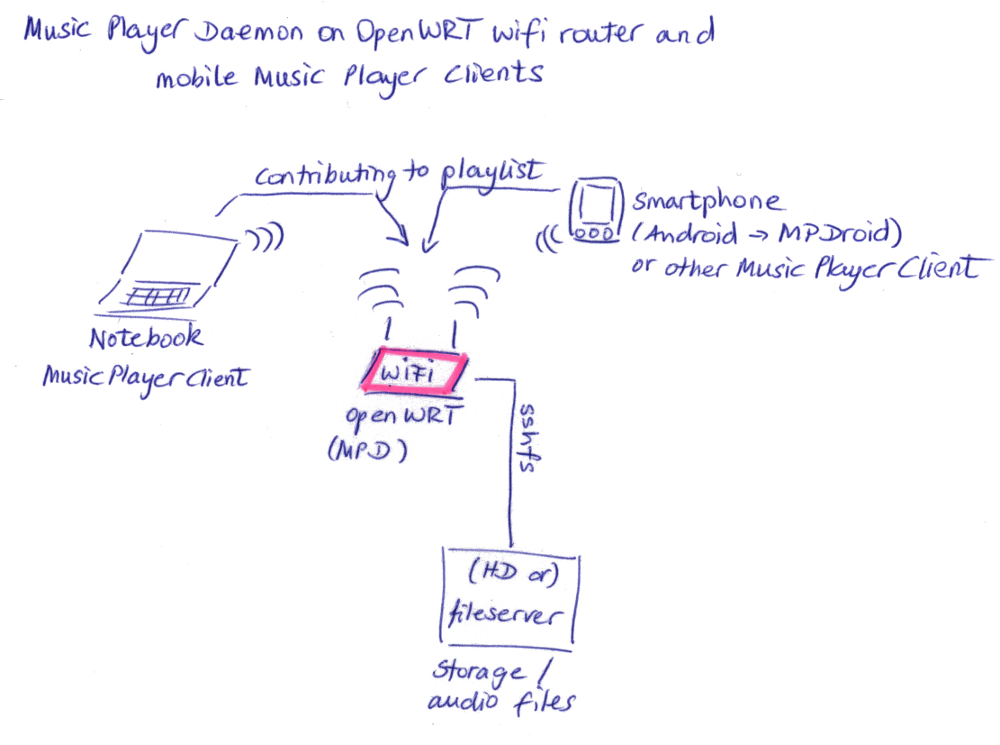
- https://wiki.openwrt.org/doc/howto/usb.audio
- https://wiki.openwrt.org/doc/howto/pulseaudio
- https://en.wikipedia.org/wiki/Advanced_Linux_Sound_Architecture
- https://en.wikipedia.org/wiki/PulseAudio
Mic Support in OpenWrt
- https://wiki.openwrt.org/doc/howto/lirc-audio_alsa
Video Support in OpenWrt
- https://wiki.openwrt.org/doc/howto/usb.video
- http://h-wrt.com/en/doc/webcam
Bluetooth Support in OpenWrt
- https://wiki.openwrt.org/doc/howto/usb.bluetooth
- https://wiki.openwrt.org/doc/howto/bluetooth.audio
- https://wiki.openwrt.org/doc/howto/bluetooth.6lowpan
- http://h-wrt.com/en/doc/bluetooth
- https://devzone.nordicsemi.com/blogs/663/6lowpan-for-bluetooth-low-energy-on-openwrt/
- https://github.com/arduino/openwrt-yun/issues/9
NFC Support in OpenWrt
- http://www.onewrt.com/hello-world/
Input (Touch, Keyboard, Inertial Sensors) Support in OpenWrt
TODO
Tools
Community
Misc
OpenWrt on TP-LINK TL-WR703N
- https://wiki.openwrt.org/toh/tp-link/tl-wr703n
- https://wiki.openwrt.org/zh-cn/toh/tp-link/tl-wr703n
- https://forum.openwrt.org/viewtopic.php?id=33387
- https://wiki.xinchejian.com/wiki/Install_OpenWRT_on_TPlink_WR703N
- https://linuxtoy.org/archives/howto-install-openwrt-on-tl-wr703n.html
- http://blog.csdn.net/qinpeng_zbdx/article/details/8570488
- https://gist.github.com/ninehills/2627163
ADB (Android Debug Bridge) in OpenWrt
- https://forum.openwrt.org/viewtopic.php?id=52720
Kernel Build Sequence
download
mkdir -p /home/robbie/GitHub/widora/dl
/home/robbie/GitHub/widora/scripts/download.pl "/home/robbie/GitHub/widora/dl" "linux-3.18.29.tar.xz" "b25737a0bc98e80d12200de93f239c28" "" "@KERNEL/linux/kernel/v3.x"
--2016-07-07 23:42:35-- ftp://ftp.all.kernel.org/pub/linux/kernel/v3.x/linux-3.18.29.tar.xz
=> '-'
Resolving ftp.all.kernel.org (ftp.all.kernel.org)... 199.204.44.194, 198.145.20.140, 149.20.4.69
Connecting to ftp.all.kernel.org (ftp.all.kernel.org)|199.204.44.194|:21... connected.
Logging in as anonymous ... Logged in!
==> SYST ... done. ==> PWD ... done.
==> TYPE I ... done. ==> CWD (1) /pub/linux/kernel/v3.x ... done.
==> SIZE linux-3.18.29.tar.xz ... 81044012
==> PASV ... done. ==> RETR linux-3.18.29.tar.xz ... done.
Length: 81044012 (77M) (unauthoritative)
extract
xzcat /home/robbie/GitHub/widora/dl/linux-3.18.29.tar.xz | tar -C /home/robbie/GitHub/widora/build_dir/toolchain-mipsel_24kec+dsp_gcc-4.8-linaro_uClibc-0.9.33.2 -xf -
patch
``` rm -rf /home/robbie/GitHub/widora/build_dir/toolchain-mipsel_24kec+dsp_gcc-4.8-linaro_uClibc-0.9.33.2/linux-3.18.29/patches; mkdir -p /home/robbie/GitHub/widora/build_dir/toolchain-mipsel_24kec+dsp_gcc-4.8-linaro_uClibc-0.9.33.2/linux-3.18.29/patches cp -fpR “/home/robbie/GitHub/widora/target/linux/generic/files”/. /home/robbie/GitHub/widora/build_dir/toolchain-mipsel_24kec+dsp_gcc-4.8-linaro_uClibc-0.9.33.2/linux-3.18.29/
| find /home/robbie/GitHub/widora/build_dir/toolchain-mipsel_24kec+dsp_gcc-4.8-linaro_uClibc-0.9.33.2/linux-3.18.29/ -name *.rej -or -name *.orig | xargs -r rm -f |
Applying /home/robbie/GitHub/widora/target/linux/generic/patches-3.18/000-keep_initrafs_the_default.patch using plaintext: patching file init/do_mounts.c
Applying /home/robbie/GitHub/widora/target/linux/generic/patches-3.18/020-ssb_update.patch using plaintext: patching file drivers/ssb/pcihost_wrapper.c patching file drivers/ssb/driver_pcicore.c patching file drivers/ssb/main.c
Applying /home/robbie/GitHub/widora/target/linux/generic/patches-3.18/021-ssb_sprom.patch using plaintext: patching file include/linux/ssb/ssb.h
… …
Applying /home/robbie/GitHub/widora/target/linux/generic/patches-3.18/999-seccomp_log.patch using plaintext: patching file kernel/seccomp.c patching file include/uapi/linux/seccomp.h touch /home/robbie/GitHub/widora/build_dir/toolchain-mipsel_24kec+dsp_gcc-4.8-linaro_uClibc-0.9.33.2/linux-3.18.29/.quilt_used ```
configure
``` /home/robbie/GitHub/widora/scripts/kconfig.pl + /home/robbie/GitHub/widora/target/linux/generic/config-3.18 /home/robbie/GitHub/widora/target/linux/ramips/mt7688/config-3.18 > /home/robbie/GitHub/widora/build_dir/target-mipsel_24kec+dsp_uClibc-0.9.33.2/linux-ramips_mt7688/linux-3.18.29/.config.target awk ‘/^(#[[:space:]]+)?CONFIG_KERNEL/{sub(“CONFIG_KERNEL_”,”CONFIG_”);print}’ /home/robbie/GitHub/widora/.config » /home/robbie/GitHub/widora/build_dir/target-mipsel_24kec+dsp_uClibc-0.9.33.2/linux-ramips_mt7688/linux-3.18.29/.config.target echo “# CONFIG_KALLSYMS_EXTRA_PASS is not set” » /home/robbie/GitHub/widora/build_dir/target-mipsel_24kec+dsp_uClibc-0.9.33.2/linux-ramips_mt7688/linux-3.18.29/.config.target echo “# CONFIG_KALLSYMS_ALL is not set” » /home/robbie/GitHub/widora/build_dir/target-mipsel_24kec+dsp_uClibc-0.9.33.2/linux-ramips_mt7688/linux-3.18.29/.config.target echo “# CONFIG_KALLSYMS_UNCOMPRESSED is not set” » /home/robbie/GitHub/widora/build_dir/target-mipsel_24kec+dsp_uClibc-0.9.33.2/linux-ramips_mt7688/linux-3.18.29/.config.target /home/robbie/GitHub/widora/scripts/metadata.pl kconfig /home/robbie/GitHub/widora/tmp/.packageinfo /home/robbie/GitHub/widora/.config 3.18 > /home/robbie/GitHub/widora/build_dir/target-mipsel_24kec+dsp_uClibc-0.9.33.2/linux-ramips_mt7688/linux-3.18.29/.config.override /home/robbie/GitHub/widora/scripts/kconfig.pl ‘m+’ ‘+’ /home/robbie/GitHub/widora/build_dir/target-mipsel_24kec+dsp_uClibc-0.9.33.2/linux-ramips_mt7688/linux-3.18.29/.config.target /dev/null /home/robbie/GitHub/widora/build_dir/target-mipsel_24kec+dsp_uClibc-0.9.33.2/linux-ramips_mt7688/linux-3.18.29/.config.override > /home/robbie/GitHub/widora/build_dir/target-mipsel_24kec+dsp_uClibc-0.9.33.2/linux-ramips_mt7688/linux-3.18.29/.config mv /home/robbie/GitHub/widora/build_dir/target-mipsel_24kec+dsp_uClibc-0.9.33.2/linux-ramips_mt7688/linux-3.18.29/.config /home/robbie/GitHub/widora/build_dir/target-mipsel_24kec+dsp_uClibc-0.9.33.2/linux-ramips_mt7688/linux-3.18.29/.config.old … …
```
build
``` make -C /home/robbie/GitHub/widora/build_dir/target-mipsel_24kec+dsp_uClibc-0.9.33.2/linux-ramips_mt7688/linux-3.18.29 HOSTCFLAGS=”-O2 -I/home/robbie/GitHub/widora/staging_dir/host/include -I/home/robbie/GitHub/widora/staging_dir/host/usr/include -Wall -Wmissing-prototype s -Wstrict-prototypes” CROSS_COMPILE=”mipsel-openwrt-linux-uclibc-“ ARCH=”mips” KBUILD_HAVE_NLS=no CONFIG_SHELL=”bash” V=1 CC=”mipsel-openwrt-linux-uclibc-gcc” modules make -f ./Makefile silentoldconfig make -f ./scripts/Makefile.build obj=scripts/basic make -f ./scripts/Makefile.build obj=scripts/kconfig silentoldconfig make -f ./scripts/Makefile.asm-generic \ make -f ./scripts/Makefile.asm-generic \ make -f ./scripts/Makefile.build obj=scripts/basic make -f ./scripts/Makefile.build obj=. make -f ./scripts/Makefile.build obj=scripts make -f ./scripts/Makefile.build obj=scripts/dtc make -f ./scripts/Makefile.build obj=scripts/mod make -f ./scripts/Makefile.build obj=init make -f ./scripts/Makefile.build obj=usr make -f ./scripts/Makefile.build obj=arch/mips/ralink make -f ./scripts/Makefile.build obj=arch/mips make -f ./scripts/Makefile.build obj=arch/mips/kernel make -f ./scripts/Makefile.build obj=arch/mips/mm make -f ./scripts/Makefile.build obj=arch/mips/net make -f ./scripts/Makefile.build obj=kernel make -f ./scripts/Makefile.build obj=kernel/bpf make -f ./scripts/Makefile.build obj=kernel/irq make -f ./scripts/Makefile.build obj=kernel/locking make -f ./scripts/Makefile.build obj=kernel/power make -f ./scripts/Makefile.build obj=kernel/printk make -f ./scripts/Makefile.build obj=kernel/rcu make -f ./scripts/Makefile.build obj=kernel/sched make -f ./scripts/Makefile.build obj=kernel/time make -f ./scripts/Makefile.build obj=mm make -f ./scripts/Makefile.build obj=fs make -f ./scripts/Makefile.build obj=fs/autofs4 make -f ./scripts/Makefile.build obj=fs/debugfs make -f ./scripts/Makefile.build obj=fs/devpts make -f ./scripts/Makefile.build obj=fs/exofs make -f ./scripts/Makefile.build obj=fs/fat make -f ./scripts/Makefile.build obj=fs/jffs2 make -f ./scripts/Makefile.build obj=fs/kernfs make -f ./scripts/Makefile.build obj=fs/nls … …
```
LD vmlinux
+ vmlinux_link .tmp_kallsyms2.o vmlinux
+ local lds=./arch/mips/kernel/vmlinux.lds
+ '[' mips '!=' um ']'
+ mipsel-openwrt-linux-uclibc-ld -m elf32ltsmip -G 0 -static -n -nostdlib --gc-sections --build-id -X -o vmlinux -T ./arch/mips/kernel/vmlinux.lds arch/mips/kernel/head.o init/built-in.o --start-group usr/built-in.o arch/mips/ralink/built-in.o arch/mips/built-in.o kernel/built-in.o mm/built-in.o fs/built-in.o ipc/built-in.o security/built-in.o crypto/built-in.o block/built-in.o lib/lib.a arch/mips/fw/lib/lib.a arch/mips/lib/lib.a arch/mips/math-emu/lib.a lib/built-in.o arch/mips/fw/lib/built-in.o arch/mips/lib/built-in.o arch/mips/math-emu/built-in.o drivers/built-in.o sound/built-in.o firmware/built-in.o arch/mips/pci/built-in.o net/built-in.o --end-group .tmp_kallsyms2.o
+ '[' -n y ']'
+ info SORTEX vmlinux
+ '[' '' '!=' silent_ ']'
+ printf ' %-7s %s\n' SORTEX vmlinux
SORTEX vmlinux
+ sortextable vmlinux
+ ./scripts/sortextable vmlinux
+ info SYSMAP System.map
+ '[' '' '!=' silent_ ']'
+ printf ' %-7s %s\n' SYSMAP System.map
SYSMAP System.map
+ mksysmap vmlinux System.map
+ bash ./scripts/mksysmap vmlinux System.map
mipsel-openwrt-linux-uclibc-objcopy -O binary -R .reginfo -R .notes -R .note -R .comment -R .mdebug -R .note.gnu.build-id -S /home/robbie/GitHub/widora/build_dir/target-mipsel_24kec+dsp_uClibc-0.9.33.2/linux-ramips_mt7688/linux-3.18.29/vmlinux /home/robbie/GitHub/widora/build_dir/target-mipsel_24kec+dsp_uClibc-0.9.33.2/linux-ramips_mt7688/vmlinux
mipsel-openwrt-linux-uclibc-objcopy -R .reginfo -R .notes -R .note -R .comment -R .mdebug -R .note.gnu.build-id -S /home/robbie/GitHub/widora/build_dir/target-mipsel_24kec+dsp_uClibc-0.9.33.2/linux-ramips_mt7688/linux-3.18.29/vmlinux /home/robbie/GitHub/widora/build_dir/target-mipsel_24kec+dsp_uClibc-0.9.33.2/linux-ramips_mt7688/vmlinux.elf
cp -fpR /home/robbie/GitHub/widora/build_dir/target-mipsel_24kec+dsp_uClibc-0.9.33.2/linux-ramips_mt7688/linux-3.18.29/vmlinux /home/robbie/GitHub/widora/build_dir/target-mipsel_24kec+dsp_uClibc-0.9.33.2/linux-ramips_mt7688/vmlinux.debug
touch /home/robbie/GitHub/widora/build_dir/target-mipsel_24kec+dsp_uClibc-0.9.33.2/linux-ramips_mt7688/linux-3.18.29/.image
install
``` install -d -m0755 /home/robbie/GitHub/widora/build_dir/target-mipsel_24kec+dsp_uClibc-0.9.33.2/root-ramips/tmp /home/robbie/GitHub/widora/build_dir/target-mipsel_24kec+dsp_uClibc-0.9.33.2/root-ramips/overlay chmod 1777 /home/robbie/GitHub/widora/build_dir/target-mipsel_24kec+dsp_uClibc-0.9.33.2/root-ramips/tmp cp /home/robbie/GitHub/widora/build_dir/target-mipsel_24kec+dsp_uClibc-0.9.33.2/linux-ramips_mt7688/vmlinux.elf /home/robbie/GitHub/widora/bin/ramips/openwrt-ramips-mt7688-vmlinux.elf cp /home/robbie/GitHub/widora/build_dir/target-mipsel_24kec+dsp_uClibc-0.9.33.2/linux-ramips_mt7688/vmlinux /home/robbie/GitHub/widora/bin/ramips/openwrt-ramips-mt7688-vmlinux.bin /home/robbie/GitHub/widora/staging_dir/host/bin/lzma e /home/robbie/GitHub/widora/build_dir/target-mipsel_24kec+dsp_uClibc-0.9.33.2/linux-ramips_mt7688/vmlinux -lc1 -lp2 -pb2 /home/robbie/GitHub/widora/build_dir/target-mipsel_24kec+dsp_uClibc-0.9.33.2/linux-ramips_mt7688/vmlinux.bin.lzma
LZMA 4.65 : Igor Pavlov : Public domain : 2009-02-03 mkimage -A mips -O linux -T kernel -C lzma -a 0x80000000 -e 0x80000000 -n “MIPS OpenWrt Linux-3.18.29” -d /home/robbie/GitHub/widora/build_dir/target-mipsel_24kec+dsp_uClibc-0.9.33.2/linux-ramips_mt7688/vmlinux.bin.lzma /home/robbie/GitHub/widora/build_dir/target-mipsel_24kec+dsp_uClibc-0.9.33.2/linux-ramips_mt7688/uImage.lzma Image Name: MIPS OpenWrt Linux-3.18.29 Created: Mon Jul 11 17:03:33 2016 Image Type: MIPS Linux Kernel Image (lzma compressed) Data Size: 1152097 Bytes = 1125.09 kB = 1.10 MB Load Address: 80000000 Entry Point: 80000000 cp /home/robbie/GitHub/widora/build_dir/target-mipsel_24kec+dsp_uClibc-0.9.33.2/linux-ramips_mt7688/uImage.lzma /home/robbie/GitHub/widora/bin/ramips/openwrt-ramips-mt7688-uImage.bin /home/robbie/GitHub/widora/staging_dir/host/bin/mksquashfs4 /home/robbie/GitHub/widora/build_dir/target-mipsel_24kec+dsp_uClibc-0.9.33.2/root-ramips /home/robbie/GitHub/widora/build_dir/target-mipsel_24kec+dsp_uClibc-0.9.33.2/linux-ramips_mt7688/root.squashfs -nopad -noappend -root-owned -comp xz -Xpreset 9 -Xe -Xlc 0 -Xlp 2 -Xpb 2 -b 256k -p ‘/dev d 755 0 0’ -p ‘/dev/console c 600 0 0 5 1’ -processors 1 Pseudo file “/dev” exists in source filesystem “/home/robbie/GitHub/widora/build_dir/target-mipsel_24kec+dsp_uClibc-0.9.33.2/root-ramips/dev”. Ignoring, exclude it (-e/-ef) to override. Parallel mksquashfs: Using 1 processor Creating 4.0 filesystem on /home/robbie/GitHub/widora/build_dir/target-mipsel_24kec+dsp_uClibc-0.9.33.2/linux-ramips_mt7688/root.squashfs, block size 262144.
[=======| ] 100/813 12% [===============- ] 200/813 24% [=======================\ ] 300/813 36% [==============================/ ] 400/813 49% [======================================| ] 500/813 61% [==============================================| ] 600/813 73% [======================================================| ] 700/813 86% [=============================================================/ ] 800/813 98% [===============================================================/] 813/813 100% Exportable Squashfs 4.0 filesystem, xz compressed, data block size 262144 compressed data, compressed metadata, compressed fragments, no xattrs duplicates are removed Filesystem size 4008.73 Kbytes (3.91 Mbytes) 30.30% of uncompressed filesystem size (13231.71 Kbytes) Inode table size 9246 bytes (9.03 Kbytes) 24.85% of uncompressed inode table size (37209 bytes) Directory table size 11230 bytes (10.97 Kbytes) 49.62% of uncompressed directory table size (22630 bytes) Number of duplicate files found 6 Number of inodes 1112 Number of files 797 Number of fragments 34 Number of symbolic links 228 Number of device nodes 1 Number of fifo nodes 0 Number of socket nodes 0 Number of directories 86 Number of ids (unique uids + gids) 1 Number of uids 1 root (0) Number of gids 1 root (0) dd if=/home/robbie/GitHub/widora/build_dir/target-mipsel_24kec+dsp_uClibc-0.9.33.2/linux-ramips_mt7688/root.squashfs of=/home/robbie/GitHub/widora/bin/ramips/openwrt-ramips-mt7688-root.squashfs bs=128k conv=sync 31+1 records in 32+0 records out 4194304 bytes (4.2 MB) copied, 0.00379955 s, 1.1 GB/s cp /home/robbie/GitHub/widora/build_dir/target-mipsel_24kec+dsp_uClibc-0.9.33.2/linux-ramips_mt7688/vmlinux /home/robbie/GitHub/widora/build_dir/target-mipsel_24kec+dsp_uClibc-0.9.33.2/linux-ramips_mt7688/vmlinux-Widora /home/robbie/GitHub/widora/build_dir/target-mipsel_24kec+dsp_uClibc-0.9.33.2/linux-ramips_mt7688/linux-3.18.29/scripts/dtc/dtc -O dtb -o /home/robbie/GitHub/widora/build_dir/target-mipsel_24kec+dsp_uClibc-0.9.33.2/linux-ramips_mt7688/Widora.dtb ../dts/Widora.dts /home/robbie/GitHub/widora/staging_dir/host/bin/patch-dtb /home/robbie/GitHub/widora/build_dir/target-mipsel_24kec+dsp_uClibc-0.9.33.2/linux-ramips_mt7688/vmlinux-Widora /home/robbie/GitHub/widora/build_dir/target-mipsel_24kec+dsp_uClibc-0.9.33.2/linux-ramips_mt7688/Widora.dtb /home/robbie/GitHub/widora/staging_dir/host/bin/lzma e /home/robbie/GitHub/widora/build_dir/target-mipsel_24kec+dsp_uClibc-0.9.33.2/linux-ramips_mt7688/vmlinux-Widora -lc1 -lp2 -pb2 /home/robbie/GitHub/widora/build_dir/target-mipsel_24kec+dsp_uClibc-0.9.33.2/linux-ramips_mt7688/vmlinux-Widora.bin.lzma
LZMA 4.65 : Igor Pavlov : Public domain : 2009-02-03
mkimage -A mips -O linux -T kernel -C lzma -a 0x80000000 -e 0x80000000 -n “MIPS OpenWrt Linux-3.18.29” -d /home/robbie/GitHub/widora/build_dir/target-mipsel_24kec+dsp_uClibc-0.9.33.2/linux-ramips_mt7688/vmlinux-Widora.bin.lzma /home/robbie/GitHub/widora/build_dir/target-mipsel_24kec+dsp_uClibc-0.9.33.2/linux-ramips_mt7688/vmlinux-Widora.uImage
Image Name: MIPS OpenWrt Linux-3.18.29
Created: Mon Jul 11 17:03:41 2016
Image Type: MIPS Linux Kernel Image (lzma compressed)
Data Size: 1153721 Bytes = 1126.68 kB = 1.10 MB
Load Address: 80000000
Entry Point: 80000000
cat /home/robbie/GitHub/widora/build_dir/target-mipsel_24kec+dsp_uClibc-0.9.33.2/linux-ramips_mt7688/vmlinux-Widora.uImage /home/robbie/GitHub/widora/build_dir/target-mipsel_24kec+dsp_uClibc-0.9.33.2/linux-ramips_mt7688/root.squashfs > /home/robbie/GitHub/widora/build_dir/target-mipsel_24kec+dsp_uClibc-0.9.33.2/linux-ramips_mt7688/openwrt-ramips-mt7688-Widora-squashfs-sysupgrade.bin
/home/robbie/GitHub/widora/staging_dir/host/bin/padjffs2 /home/robbie/GitHub/widora/build_dir/target-mipsel_24kec+dsp_uClibc-0.9.33.2/linux-ramips_mt7688/openwrt-ramips-mt7688-Widora-squashfs-sysupgrade.bin 4 8 16 64 128 256
padding image to 00504000
padding image to 00510000
padding image to 00520000
padding image to 00540000
if [ stat -c%s "/home/robbie/GitHub/widora/build_dir/target-mipsel_24kec+dsp_uClibc-0.9.33.2/linux-ramips_mt7688/openwrt-ramips-mt7688-Widora-squashfs-sysupgrade.bin" -gt 16121856 ]; then echo “Warning: /home/robbie/GitHub/widora/build_dir/target-mipsel_24kec+dsp_uClibc-0.9.33.2/linux-ramips_mt7688/openwrt-ramips-mt7688-Widora-squashfs-sysupgrade.bin is too big” >&2; else cp -fpR /home/robbie/GitHub/widora/build_dir/target-mipsel_24kec+dsp_uClibc-0.9.33.2/linux-ramips_mt7688/openwrt-ramips-mt7688-Widora-squashfs-sysupgrade.bin /home/robbie/GitHub/widora/bin/ramips/openwrt-ramips-mt7688-Widora-squashfs-sysupgrade.bin; fi
( cd /home/robbie/GitHub/widora/bin/ramips ; find -maxdepth 1 -type f ! -name ‘md5sums’ -printf “%P\n” | sort | xargs md5sum –binary > md5sums )
( cd /home/robbie/GitHub/widora/bin/ramips ; find -maxdepth 1 -type f ! -name ‘md5sums’ -printf “%P\n” | sort | xargs openssl dgst -sha256 > sha256sums )
make[5]: Leaving directory /home/robbie/GitHub/widora/target/linux/ramips/image'
make[4]: Leaving directory /home/robbie/GitHub/widora/target/linux/ramips’
make[3]: Leaving directory /home/robbie/GitHub/widora/target/linux'
make[2]: Leaving directory /home/robbie/GitHub/widora’
export MAKEFLAGS= ;make -w -r package/index
make[2]: Entering directory /home/robbie/GitHub/widora'
Generating package index...
Generating index for package ./base-files_157.2-r49389_ramips_24kec.ipk
Generating index for package ./busybox_1.23.2-1_ramips_24kec.ipk
Generating index for package ./dnsmasq_2.73-1_ramips_24kec.ipk
Generating index for package ./dropbear_2015.67-1_ramips_24kec.ipk
Generating index for package ./firewall_2015-07-27_ramips_24kec.ipk
Generating index for package ./fstools_2016-01-10-96415afecef35766332067f4205ef3b2c7561d21_ramips_24kec.ipk
Generating index for package ./hostapd-common_2015-03-25-1_ramips_24kec.ipk
Generating index for package ./ip6tables_1.4.21-1_ramips_24kec.ipk
Generating index for package ./iptables_1.4.21-1_ramips_24kec.ipk
Generating index for package ./iwinfo_2015-06-01-ade8b1b299cbd5748db1acf80dd3e9f567938371_ramips_24kec.ipk
Generating index for package ./jshn_2015-11-08-10429bccd0dc5d204635e110a7a8fae7b80d16cb_ramips_24kec.ipk
Generating index for package ./jsonfilter_2014-06-19-cdc760c58077f44fc40adbbe41e1556a67c1b9a9_ramips_24kec.ipk
Generating index for package ./kmod-ac97_3.18.29-1_ramips_24kec.ipk
Generating index for package ./kmod-dma-buf_3.18.29-1_ramips_24kec.ipk
Generating index for package ./kmod-drv_regopt_3.18.29-1_ramips_24kec.ipk
Generating index for package ./kmod-fs-autofs4_3.18.29-1_ramips_24kec.ipk
Generating index for package ./kmod-fs-vfat_3.18.29-1_ramips_24kec.ipk
Generating index for package ./kmod-gpio-button-hotplug_3.18.29-1_ramips_24kec.ipk
Generating index for package ./kmod-i2c-core_3.18.29-1_ramips_24kec.ipk
Generating index for package ./kmod-i2c-ralink_3.18.29-1_ramips_24kec.ipk
Generating index for package ./kmod-input-core_3.18.29-1_ramips_24kec.ipk
Generating index for package ./kmod-ip6tables_3.18.29-1_ramips_24kec.ipk
Generating index for package ./kmod-ipt-conntrack_3.18.29-1_ramips_24kec.ipk
Generating index for package ./kmod-ipt-core_3.18.29-1_ramips_24kec.ipk
Generating index for package ./kmod-ipt-nat_3.18.29-1_ramips_24kec.ipk
Generating index for package ./kmod-ipv6_3.18.29-1_ramips_24kec.ipk
Generating index for package ./kmod-leds-gpio_3.18.29-1_ramips_24kec.ipk
Generating index for package ./kmod-ledtrig-netdev_3.18.29-1_ramips_24kec.ipk
Generating index for package ./kmod-lib-crc-ccitt_3.18.29-1_ramips_24kec.ipk
Generating index for package ./kmod-lib-lzo_3.18.29-1_ramips_24kec.ipk
Generating index for package ./kmod-mmc_3.18.29-1_ramips_24kec.ipk
Generating index for package ./kmod-nf-conntrack6_3.18.29-1_ramips_24kec.ipk
Generating index for package ./kmod-nf-conntrack_3.18.29-1_ramips_24kec.ipk
Generating index for package ./kmod-nf-ipt6_3.18.29-1_ramips_24kec.ipk
Generating index for package ./kmod-nf-ipt_3.18.29-1_ramips_24kec.ipk
Generating index for package ./kmod-nf-nat_3.18.29-1_ramips_24kec.ipk
Generating index for package ./kmod-nf-nathelper_3.18.29-1_ramips_24kec.ipk
Generating index for package ./kmod-nls-base_3.18.29-1_ramips_24kec.ipk
Generating index for package ./kmod-nls-cp437_3.18.29-1_ramips_24kec.ipk
Generating index for package ./kmod-nls-iso8859-1_3.18.29-1_ramips_24kec.ipk
Generating index for package ./kmod-nls-utf8_3.18.29-1_ramips_24kec.ipk
Generating index for package ./kmod-ppp_3.18.29-1_ramips_24kec.ipk
Generating index for package ./kmod-pppoe_3.18.29-1_ramips_24kec.ipk
Generating index for package ./kmod-pppox_3.18.29-1_ramips_24kec.ipk
Generating index for package ./kmod-regmap_3.18.29-1_ramips_24kec.ipk
Generating index for package ./kmod-scsi-core_3.18.29-1_ramips_24kec.ipk
Generating index for package ./kmod-sdhci-mt7620_3.18.29-1_ramips_24kec.ipk
Generating index for package ./kmod-sdhci_3.18.29-1_ramips_24kec.ipk
Generating index for package ./kmod-slhc_3.18.29-1_ramips_24kec.ipk
Generating index for package ./kmod-sound-core_3.18.29-1_ramips_24kec.ipk
Generating index for package ./kmod-sound-mtk_3.18.29-1_ramips_24kec.ipk
Generating index for package ./kmod-sound-soc-core_3.18.29-1_ramips_24kec.ipk
Generating index for package ./kmod-usb-core_3.18.29-1_ramips_24kec.ipk
Generating index for package ./kmod-usb-ohci_3.18.29-1_ramips_24kec.ipk
Generating index for package ./kmod-usb-storage_3.18.29-1_ramips_24kec.ipk
Generating index for package ./kmod-usb2_3.18.29-1_ramips_24kec.ipk
Generating index for package ./kmod-video-core_3.18.29-1_ramips_24kec.ipk
Generating index for package ./kmod-video-uvc_3.18.29-1_ramips_24kec.ipk
Generating index for package ./kmod-video-videobuf2_3.18.29-1_ramips_24kec.ipk
Generating index for package ./libblobmsg-json_2015-11-08-10429bccd0dc5d204635e110a7a8fae7b80d16cb_ramips_24kec.ipk
Generating index for package ./libgcc_4.8-linaro-1_ramips_24kec.ipk
Generating index for package ./libip4tc_1.4.21-1_ramips_24kec.ipk
Generating index for package ./libip6tc_1.4.21-1_ramips_24kec.ipk
Generating index for package ./libiwinfo_2015-06-01-ade8b1b299cbd5748db1acf80dd3e9f567938371_ramips_24kec.ipk
Generating index for package ./libjson-c_0.12-1_ramips_24kec.ipk
Generating index for package ./libjson-script_2015-11-08-10429bccd0dc5d204635e110a7a8fae7b80d16cb_ramips_24kec.ipk
Generating index for package ./libncurses_5.9-2_ramips_24kec.ipk
Generating index for package ./libnl-tiny_0.1-4_ramips_24kec.ipk
Generating index for package ./libopenssl_1.0.2h-1_ramips_24kec.ipk
Generating index for package ./libpthread_0.9.33.2-1_ramips_24kec.ipk
Generating index for package ./librt_0.9.33.2-1_ramips_24kec.ipk
Generating index for package ./libubox_2015-11-08-10429bccd0dc5d204635e110a7a8fae7b80d16cb_ramips_24kec.ipk
Generating index for package ./libubus_2015-05-25-f361bfa5fcb2daadf3b160583ce665024f8d108e_ramips_24kec.ipk
Generating index for package ./libuci_2015-08-27.1-1_ramips_24kec.ipk
Generating index for package ./libxtables_1.4.21-1_ramips_24kec.ipk
Generating index for package ./logd_2015-11-22-c086167a0154745c677f8730a336ea9cf7d71031_ramips_24kec.ipk
Generating index for package ./maccalc_1_ramips_24kec.ipk
Generating index for package ./mountd_2015-11-22-8476a03b25d457e99f59e6372b8d9faebe2266f8_ramips_24kec.ipk
Generating index for package ./mtd_21_ramips_24kec.ipk
Generating index for package ./mtk-sdk-wifi_2015-06-01-ade8b1b299cbd5748db1acf80dd3e9f567938371_ramips_24kec.ipk
Generating index for package ./netifd_2015-12-16-245527193e90906451be35c2b8e972b8712ea6ab_ramips_24kec.ipk
Generating index for package ./odhcp6c_2015-07-29-dc186d6d2b0dd4ad23ca5fc69c00e81f796ff6d9_ramips_24kec.ipk
Generating index for package ./odhcpd_2015-11-19-01d3f9d64486ac1daa144848944e877e7f0cb762_ramips_24kec.ipk
Generating index for package ./opkg_9c97d5ecd795709c8584e972bfdf3aee3a5b846d-9_ramips_24kec.ipk
Generating index for package ./ppp-mod-pppoe_2.4.7-6_ramips_24kec.ipk
Generating index for package ./ppp_2.4.7-6_ramips_24kec.ipk
Generating index for package ./procd_2015-10-29.1-d5fddd91b966424bb63e943e789704d52382cc18_ramips_24kec.ipk
Generating index for package ./reg_1_ramips_24kec.ipk
Generating index for package ./rpcd-mod-iwinfo_2016-04-13-73aea9b8b621a1ce034bc6ee00c9d058a40c8a3d_ramips_24kec.ipk
Generating index for package ./rpcd-mod-rpcsys_2016-04-13-73aea9b8b621a1ce034bc6ee00c9d058a40c8a3d_ramips_24kec.ipk
Generating index for package ./rpcd_2016-04-13-73aea9b8b621a1ce034bc6ee00c9d058a40c8a3d_ramips_24kec.ipk
Generating index for package ./shairport_mmap_2014-10-28-2_ramips_24kec.ipk
Generating index for package ./swconfig_10_ramips_24kec.ipk
Generating index for package ./terminfo_5.9-2_ramips_24kec.ipk
Generating index for package ./uboot-envtools_2014.10-2_ramips_24kec.ipk
Generating index for package ./ubox_2015-11-22-c086167a0154745c677f8730a336ea9cf7d71031_ramips_24kec.ipk
Generating index for package ./ubus_2015-05-25-f361bfa5fcb2daadf3b160583ce665024f8d108e_ramips_24kec.ipk
Generating index for package ./ubusd_2015-05-25-f361bfa5fcb2daadf3b160583ce665024f8d108e_ramips_24kec.ipk
Generating index for package ./uci_2015-08-27.1-1_ramips_24kec.ipk
Generating index for package ./uhttpd_2015-11-08-fe01ef3f52adae9da38ef47926cd50974af5d6b7_ramips_24kec.ipk
Generating index for package ./usign_2015-05-08-cf8dcdb8a4e874c77f3e9a8e9b643e8c17b19131_ramips_24kec.ipk
Generating index for package ./wireless-tools_29-5_ramips_24kec.ipk
Generating index for package ./wpad-mini_2015-03-25-1_ramips_24kec.ipk
Generating index for package ./zlib_1.2.8-1_ramips_24kec.ipk
Generating index for package ./alsa-lib_1.0.28-1_ramips_24kec.ipk
Generating index for package ./alsa-utils_1.0.28-2_ramips_24kec.ipk
Generating index for package ./avahi-dbus-daemon_0.6.31-12_ramips_24kec.ipk
Generating index for package ./cgi-io_1_ramips_24kec.ipk
Generating index for package ./dbus_1.9.14-1_ramips_24kec.ipk
Generating index for package ./kmod-fs-exfat_3.18.29+git-20150301-1_ramips_24kec.ipk
Generating index for package ./libavahi-client_0.6.31-12_ramips_24kec.ipk
Generating index for package ./libavahi-dbus-support_0.6.31-12_ramips_24kec.ipk
Generating index for package ./libdaemon_0.14-5_ramips_24kec.ipk
Generating index for package ./libdbus_1.9.14-1_ramips_24kec.ipk
Generating index for package ./libexpat_2.1.0-3_ramips_24kec.ipk
Generating index for package ./libid3tag_0.15.1b-4_ramips_24kec.ipk
Generating index for package ./libjpeg_9a-1_ramips_24kec.ipk
Generating index for package ./libmad_0.15.1b-3_ramips_24kec.ipk
Generating index for package ./madplay-alsa_0.15.2b-4_ramips_24kec.ipk
Generating index for package ./mjpg-streamer_r182-7_ramips_24kec.ipk
Generating index for package ./spi-tools_1-cc6a41fdcec60610703ba6db488c621c64952898_ramips_24kec.ipk
Signing package index...
``
Boot Process
The booting process in OpenWRT box is similar to PC’s, especially to Linux and UNIX. It can be divided into three stages or Process Trinity, according to OpenWRT definition.
Bootloader
Boot loader is a special program for booting the device for first time. Mostly, OpenWRT use grub to initialize and parses any options that are presented at the boot menu. After initialization done, it would terminate and give control to kernel.
In OpenWRT, the process happened as following:
- the bootloader on the flash gets executed
- the bootloader performs the POST (Power-On-Self-Test), which is a low-level hardware initialization
- the bootloader decompresses the Kernel image from its (known!) location on the flash storage into main memory (=RAM)
- the bootloader executes the Kernel with init=… option (default is
/etc/preinit)
Kernel
When bootloader has done its tasks, the control is passed to kernel. Kernel then do following operations:
- the Kernel further bootstraps itself (sic!)
- issues the command/op-code
start_kernel - kernel scans the mtd partition rootfs for a valid superblock and mounts the SquashFS partition (which contains /etc) once found. (More info at technical.details)
/etc/preinitdoes pre-initialization setups (create directories, mount fs,/proc,/sys, …)- the Kernel mounts any other partition (e.g. jffs2 partition) under rootfs (root file system). see flash.layout, preinit and root mount, and also udev make sure
- if “INITRAMFS” is not defined, calls
/sbin/init(the mother of all processes) - finally some kernel thread becomes the userspace init process
Init
Init is a startup script invoked by kernel to starts some service / system non-related to kernel.
The user space starts when kernel mounts rootfs and the very first program to run is (by default) /sbin/init. The interface between user space application and kernel is clib and the syscalls kernel offers.
Init script is considered as the “Mother of All Processes” since its controls things like starting daemon, changing runlevels, setting up the console/pseudo consoles/tty access daemons, housekeeping chores, etc.
In OpenWRT, following are the processes happen on Init process:
- init reads
/etc/inittabfor the “sysinit” entry (default is “::sysinit:/etc/init.d/rcS S boot”) - init calls
/etc/init.d/rcSS boot - rcS executes the symlinks to the actual startup scripts located in
/etc/rc.d/S##xxxxxxwith option “start”: - after rcS finishes, system should be up and running
https://wiki.openwrt.org/doc/techref/process.boot
https://xathrya.id/2015/12/09/openwrt-boot-process/
Compare with Ubuntu and Android
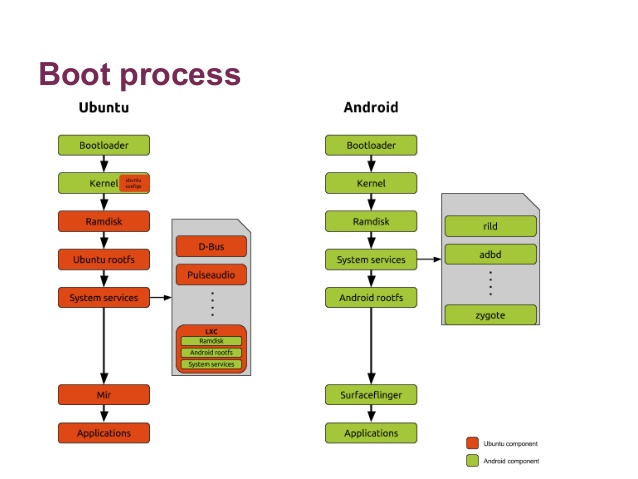
How To
Backup ART Partition (Factory Data)
``` # target side root@Widora:/# cat /proc/mtd dev: size erasesize name mtd0: 00030000 00010000 “u-boot” mtd1: 00010000 00010000 “u-boot-env” mtd2: 00010000 00010000 “factory” mtd3: 00fb0000 00010000 “firmware” mtd4: 00119d29 00010000 “kernel” mtd5: 00e962d7 00010000 “rootfs” root@Widora:/# dd if=/dev/mtd2 of=/tmp/art.backup.bin 128+0 records in 128+0 records out
# host side scp root@192.168.31.xxx:/tmp/art.backup.bin . ```
OpenWrt Filesystem and Memory
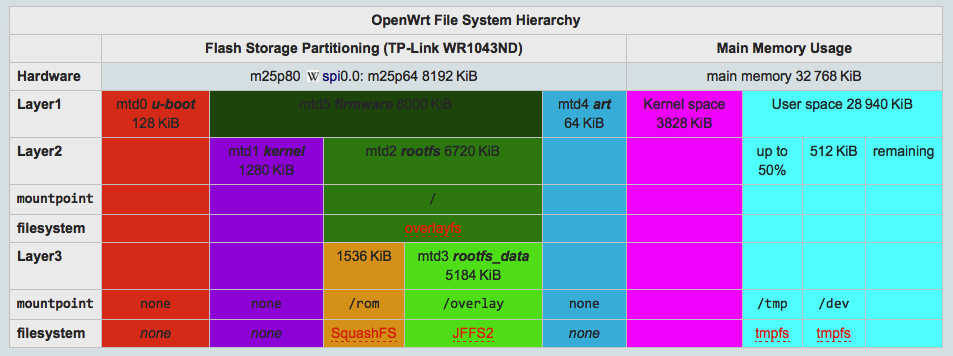
- / this is your entire root filesystem, it comprises /rom and /overlay. Please ignore /rom and /overlay and use exclusively / for your daily routines!
- /rom contains all the basic files, like busybox, dropbear or iptables. It also includes default configuration files used when booting into OpenWrt Failsafe mode. It does not contain the Linux kernel. All files in this directory are located on the SqashFS partition, and thus cannot be altered or deleted. But, because we use overlay_fs filesystem, so called overlay-whiteout-symlinks can be created on the JFFS2 partition.
- /overlay is the writable part of the file system that gets merged with /rom to create a uniform /-tree. It contains anything that was written to the router after installation, e.g. changed configuration files, additional packages installed with opkg, etc. It is formated with JFFS2. Rather than deleting the files, insert a whiteout, a special high-priority entry that marks the file as deleted. File system code that sees a whiteout entry for file F behaves as if F does not exist.
- /tmp is a tmpfs-partition
- /dev
https://wiki.openwrt.org/doc/techref/file_system
Restore ART Partition
mtd -r write /tmp/art.backup.bin factory
mtd usage:
Usage: mtd [<options> ...] <command> [<arguments> ...] <device>[:<device>...]
The device is in the format of mtdX (eg: mtd4) or its label.
mtd recognizes these commands:
unlock unlock the device
refresh refresh mtd partition
erase erase all data on device
verify <imagefile>|- verify <imagefile> (use - for stdin) to device
write <imagefile>|- write <imagefile> (use - for stdin) to device
jffs2write <file> append <file> to the jffs2 partition on the device
fixseama fix the checksum in a seama header on first boot
Following options are available:
-q quiet mode (once: no [w] on writing,
twice: no status messages)
-n write without first erasing the blocks
-r reboot after successful command
-f force write without trx checks
-e <device> erase <device> before executing the command
-d <name> directory for jffs2write, defaults to "tmp"
-j <name> integrate <file> into jffs2 data when writing an image
-s <number> skip the first n bytes when appending data to the jffs2 partiton, defaults to "0"
-p write beginning at partition offset
-l <length> the length of data that we want to dump
Example: To write linux.trx to mtd4 labeled as linux and reboot afterwards
mtd -r write linux.trx linux
https://wiki.openwrt.org/doc/howto/restore_art_partition
Integrate Kernel Git Repo in OpenWrt Environment
The OpenWrt build system supports pulling a kernel from a git repository, or even using an “external” kernel directory. In order to use these features, run the following:
make menuconfig
-> Advanced configuration options (for developers)
-> Use external kernel tree
-or-
-> Enter git repository to clone
The string should contain the full git clone url.
Note that the kernel version is being assumed as the kernel version
specified in your target’s Makefile, so you might want to adapt it.
This is important for the paths for some kernel modules, as well as
which target/linux/*/config-<version> get used for the kernel config.
Also you need to apply OpenWrt patches by hand if you need them,
especially if you want to build flashable images (for ramdisk images
you usually don’t need much, e.g. I can build and boot a vanilla linux
bcm63xx ramdisk image if the kernel is new enough).
Some packages also depend on OpenWrt kernel patches, like iptables.
http://openwrt-devel.openwrt.narkive.com/9ak1CBMO/integrate-kernel-git-repo-in-openwrt-environment